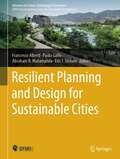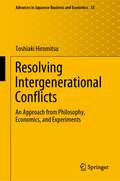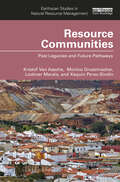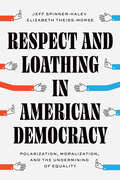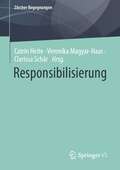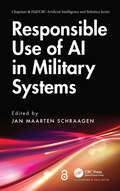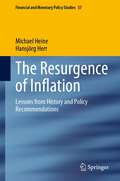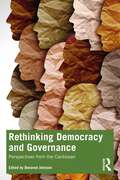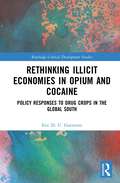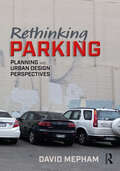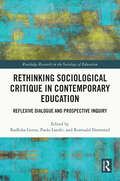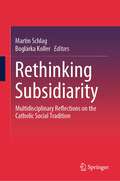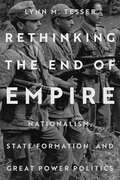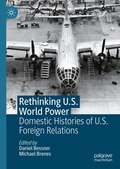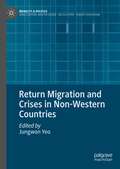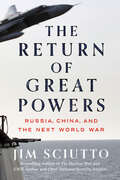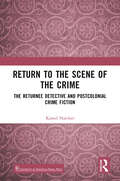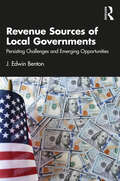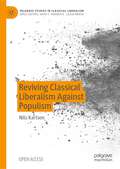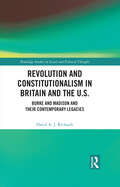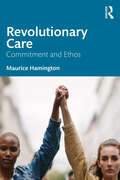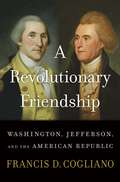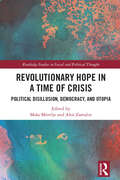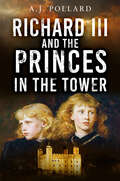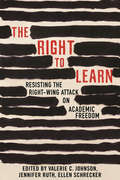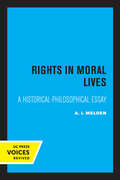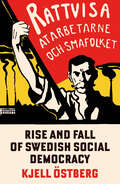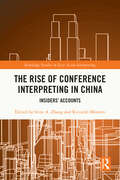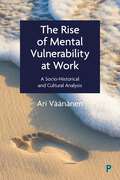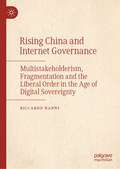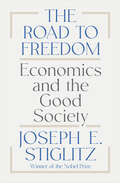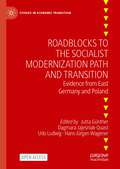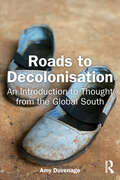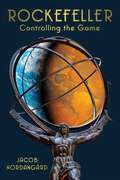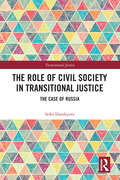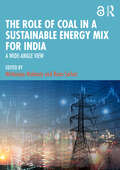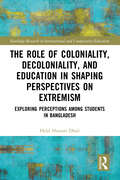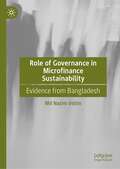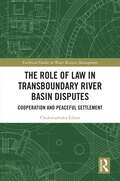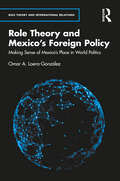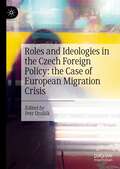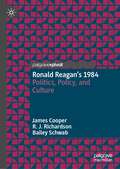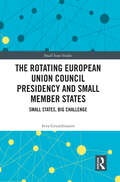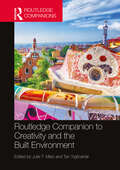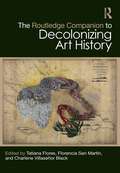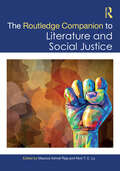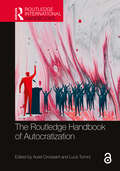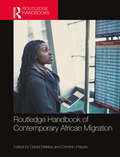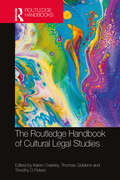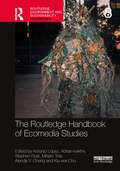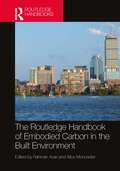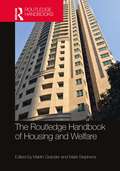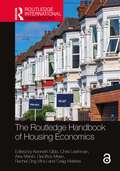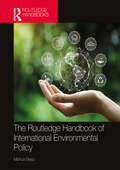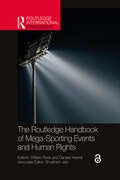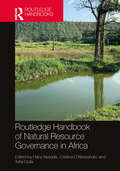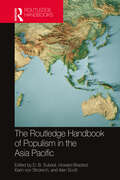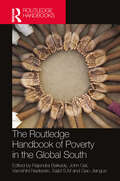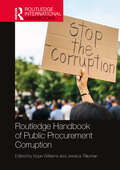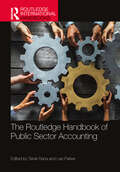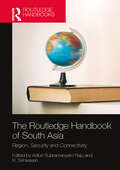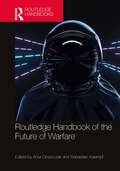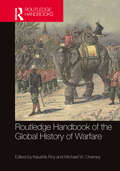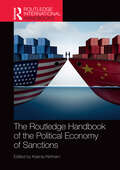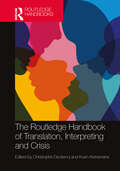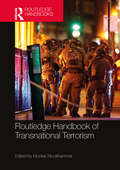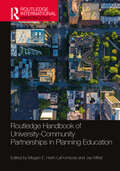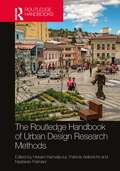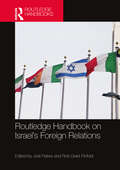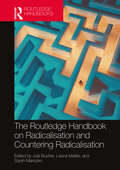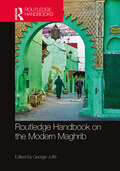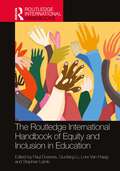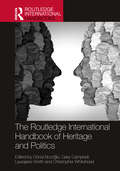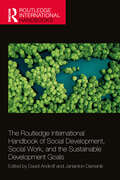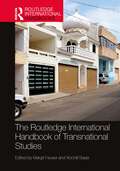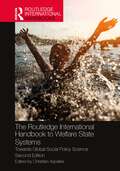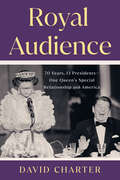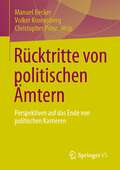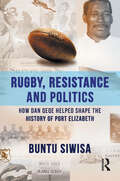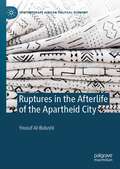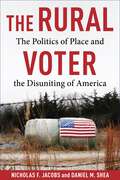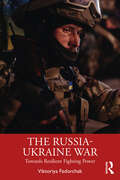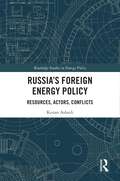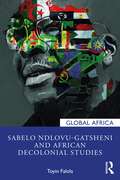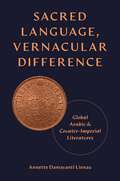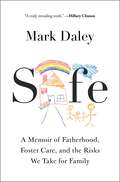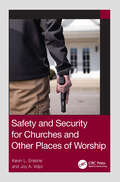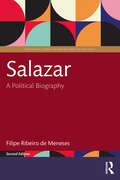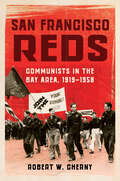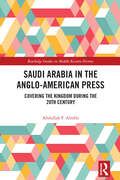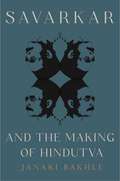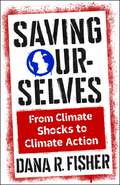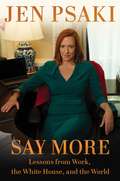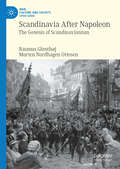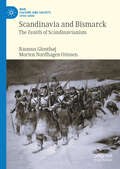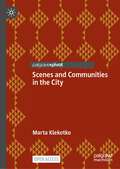- Table View
- List View
Resilient Planning and Design for Sustainable Cities (Advances in Science, Technology & Innovation)
by Francesco Alberti Paola Gallo Abraham R. Matamanda Eric J. StraussThis book discusses a crucial paradigm shift in urban planning and architectural design, addressing the urgent need for sustainability and adaptation in the face of rapidly changing climate and urban landscapes. Ideal for urban planners, architects, researchers, and policymakers, this book weaves together cutting-edge research and innovative applications from the 7th edition of the international conference on Urban Planning and Architectural Design for Sustainable Development organized by IEREK in collaboration with the Architecture Department at the University of Florence, Italy. Through a collection of double-blind peer-reviewed papers, it offers a cohesive narrative emphasizing the vital role of spatial design at all scales. Readers will explore diverse case studies, from bustling megacities to forgotten villages, showcasing the local impacts of global challenges and the efforts to prevent, neutralize or mitigate them. With an insightful blend of qualitative and quantitative methods, the book uncovers the multi-functionality of blue-green infrastructure, the potentials of urban voids, and the urgent need for ecological transition. Unveiling the gap between current governance instruments and pressing challenges, this book serves as a compass for crafting inclusive, livable, and environmentally conscious cities and communities.
Resolving Intergenerational Conflicts: An Approach from Philosophy, Economics, and Experiments (Advances in Japanese Business and Economics #33)
by Toshiaki HiromitsuThis book is an unprecedented consideration of the challenges of what we can do for generations yet to come. Many growing intergenerational conflicts of interest, such as climate change and fiscal sustainability, are the result of the historically new progress of increasing human power, and the resolution of those conflicts demands a new intergenerational ethic. The book offers fresh new ideas for resolving intergenerational conflicts through the exploration of an entirely new field, conceptualized in philosophy, developed in economics, and tested in experiments. In particular, this work develops the theory of intergenerational cooperation based on a new relationship of direct reciprocity between generations. From experimental results, the possibility of intergenerational cooperation through Kantian categorical imperative is shown. The book also examines the effectiveness of inviting representatives of future generations, which are called "imaginary future generations", into the deliberations for current policy decisions. The original Japanese edition of this book was awarded the 66th Nikkei Prize for Excellent Books in Economic Science. The prize was established in 1958 to contribute to the advancement of academics and knowledge in the fields of economics, management, and accounting, as well as to its general dissemination and application.
Resource Communities: Past Legacies and Future Pathways (Earthscan Studies in Natural Resource Management)
by Kristof Van Assche Monica Gruezmacher Lochner Marais Xaquin Perez-SindinThis book provides an innovative approach to understanding the governance of resource communities, by showcasing how the past and present informs the future. Resource communities have complicated relationships with the past, and this makes their relationship with the future, and the future itself, also complicated. The book digs deeply into the myriad legacies left by a history of resource extraction in a community and makes use of interdisciplinary and transdisciplinary perspectives to understand the complex issues being faced by a range of different communities that are reliant on different types of resources across the world. From coal and gold mining, to fishing towns and logging communities, the book explores the legacies of boom and bust economies, social memory, trauma and identity, the interactions between power and knowledge and the implications for adaptive governance. Balancing conceptual and theoretical understandings with empirical and practical knowledge of resource communities, natural resource use and social-ecological relationships, the book argues that solutions for individual communities need to be embraced in the community and not just in the perspectives of visiting experts. Linking the past, present and futures of resource communities in a new way, the book concludes by providing practical recommendations for breaking open dependencies on the past, including deepening awareness of the social, economic and environmental contexts, establishing strong governance and developing community strategies, plans and policies for the future. This book will be of great interest to students and scholars of natural resource governance and management, extractive industries, environmental policy, community planning and development, environmental geography and sustainable development, as well as policymakers involved in supporting community development in natural resource-dependent communities across the world.
Respect and Loathing in American Democracy: Polarization, Moralization, and the Undermining of Equality (Chicago Studies in American Politics)
by Jeff Spinner-Halev Elizabeth Theiss-MorseA deep examination of why respect is in short supply in politics today and why it matters. Respect is in trouble in the United States. Many Americans believe respecting others is a necessary virtue, yet many struggle to respect opposing partisans. Surprisingly, it is liberal citizens, who hold respect as central to their view of democratic equality, who often have difficulty granting respect to others. Drawing on evidence from national surveys, focus groups, survey experiments, and the views of political theorists, Jeff Spinner-Halev and Elizabeth Theiss-Morse explain why this is and why respect is vital to—and yet so lacking in—contemporary US politics. Respect and Loathing in American Democracy argues that liberals and conservatives are less divided than many believe, but alienate one another because they moralize different issues. Liberals moralize social justice, conservatives champion national solidarity, and this worldview divide keeps them at odds. Respect is both far-reaching and vital, yet it is much harder to grant than many recognize, partly because of the unseen tension between respect, social justice, and national solidarity. Respect and Loathing in American Democracy proposes a path forward that, while challenging, is far from impossible for citizens to traverse.
Responsibilisierung (Zürcher Begegnungen)
by Catrin Heite Veronika Magyar-Haas Clarissa SchärDer Band prüft den Begriff Responsibilisierung aus unterschiedlichen disziplinären Perspektiven auf seine Aktualität, sein analytisches Gewicht und seine theoretischen Bedeutungen und bringt so die Erziehungswissenschaft mit der Soziologie, der Philosophie oder der Geschichtswissenschaft ins Gespräch. Es wird sowohl danach gefragt, welche tragfähigen theoretischen, analytischen und politischen Perspektiven mit einer positiven Bezugnahme auf die Begriffe ‹Verantwortung› und ‹Responsibilisierung› verbunden sind, als auch danach, welche Kritiken angemessen erscheinen.
Responsible Use of AI in Military Systems (Chapman & Hall/CRC Artificial Intelligence and Robotics Series)
by Jan Maarten SchraagenArtificial Intelligence (AI) is widely used in society today. The (mis)use of biased data sets in machine learning applications is well‑known, resulting in discrimination and exclusion of citizens. Another example is the use of non‑transparent algorithms that can’t explain themselves to users, resulting in the AI not being trusted and therefore not being used when it might be beneficial to use it.Responsible Use of AI in Military Systems lays out what is required to develop and use AI in military systems in a responsible manner. Current developments in the emerging field of Responsible AI as applied to military systems in general (not merely weapons systems) are discussed. The book takes a broad and transdisciplinary scope by including contributions from the fields of philosophy, law, human factors, AI, systems engineering, and policy development.Divided into five sections, Section I covers various practical models and approaches to implementing military AI responsibly; Section II focuses on liability and accountability of individuals and states; Section III deals with human control in human‑AI military teams; Section IV addresses policy aspects such as multilateral security negotiations; and Section V focuses on ‘autonomy’ and ‘meaningful human control’ in weapons systems.Key Features: Takes a broad transdisciplinary approach to responsible AI Examines military systems in the broad sense of the word Focuses on the practical development and use of responsible AI Presents a coherent set of chapters, as all authors spent two days discussing each other’s work This book provides the reader with a broad overview of all relevant aspects involved with the responsible development, deployment and use of AI in military systems. It stresses both the advantages of AI as well as the potential downsides of including AI in military systems.
The Resurgence of Inflation: Lessons from History and Policy Recommendations (Financial and Monetary Policy Studies #57)
by Michael Heine Hansjörg HerrIn light of the resurgence of inflation in developed industrialised countries following a period of inordinately low inflation, this book analyses the causes and devastating effects of inflation by drawing lessons from the past. Focusing on the German hyperinflation of the 1920s and the inflationary waves of the 1970s, it examines the resulting economic crises and their influence on the subsequent periods of social and political turmoil, namely the fascism of the 1930s and the neoliberal revolution of the 1980s. Featuring five detailed case studies on inflationary waves in various countries in the 1970s, the book identifies economic policy errors of the past, seeking to prevent their recurrence. Offering empirical and theoretical insights alike, the authors present strategies for effectively combating inflation and deflation. In turn, the book assesses the complex ties between wage increases, income distribution, and price changes, ultimately providing valuable recommendations on how wage policy can be used to stabilise price level increases at a low level in a world characterised by diverse and extreme economic shocks.“The Resurgence of Inflation” fosters a vital discourse on wage and price dynamics, economic development and the role of trade unions, making it an essential read for policymakers, economists, and anyone seeking a deeper understanding of today’s economic challenges.
Rethinking Democracy and Governance: Perspectives from the Caribbean
by Donavon JohnsonDemocracy can be understood as a concept as well as a system of government associated with certain values, including transparency, accountability, the protection of rights, and non-oppressive government. This cutting edge new book explores the current contours of democracy and asks important questions such as: Does contemporary democracy mean the same thing that it did centuries ago? Are the longstanding assumptions about democracy and good governance sustainable in the face of digital transformation, paradigm shifts, and the liberalization of knowledge? Is democracy still applicable in the way that it has been traditionally envisioned? Gathering together insights from academics and practitioners with expertise on democracy and governance in the Caribbean context, this book is designed to spark a conversation about the ways in which appetites for democracy may be shifting in the Caribbean and beyond, exploring the conditions that brings these shifts to bear. Section one focuses on conceptual pieces that investigate democracy and good governance, their definition, and comparative analysis of how the conceptualization of democracy can shape outcomes in different governmental contexts. Section two explores the ways in which events, trends, and technologies have impacted democratic or undemocratic values and attitudes. Section three examines shifts in democratic inclination in the 21st century. Together the chapters represent an overdue study of the foundational governmental system of our time in a region that has historically been overlooked. Rethinking Democracy and Governance: Perspectives from the Caribbean is required reading for students of governance, public administration, and public policy.
Rethinking Illicit Economies in Opium and Cocaine: Policy Responses to Drug Crops in the Global South (Routledge Critical Development Studies)
by Eric D. GutierrezThis book investigates the cross-border trade in illicit drug crops in the global south. It exposes an important paradox: despite all the dangers and negative consequences of these criminal networks, in many cases, they also provide marginalised and excluded communities with important private sources of protection, investment, and employment. This book reconstructs and compares socioeconomic contexts, criminal careers, and changes in farmgate prices of illicit coca and opium poppy crops in Afghanistan, Myanmar, Colombia, and Bolivia. It investigates the politics of strange bedfellows; informal bankers-without-suits providing cross-border financial services to the undocumented and the unbanked; the criminals without borders; and the mystery of illicit crop prices. The book challenges commonly held assumptions and casts new light on how relationships of conflict and accommodation are arranged and re-arranged in fluid, ever-changing contexts, producing often paradoxical outcomes. It then suggests policy reforms and alternative approaches to drug policy, development aid, and peacebuilding work. Researchers and students across development, peacebuilding, illicit economies, and conflict studies will find this book an important source of original research and analysis. It will also be useful for politicians, commentators and public officials considering what to do differently in tackling illicit drug economies.
Rethinking Parking: Planning and Urban Design Perspectives
by David MephamFor much of the past century, we have viewed the issue of parking from the driver’s seat. It follows that key narratives about parking reaffirm the immediate needs of the driver. A consequence of this approach is a failure to understand the significant damage that parking causes to the destination. That damage is amplified by ‘cheap, easy’ parking at the expense of place and access outcomes. Viewing parking from an urban planning and design perspective highlights different issues and opportunities. Five perspectives are offered: Place – If we gave drivers all the parking they wanted, the destination would not be worth visiting. Politics – Parking is intensely territorial, emotional, and prone to populism, and this is a barrier to strategic and sustainable parking reform. Policy – Parking tends to be focused on the ‘me, here and now’ needs of the driver at the expense of bigger picture and longer term policy objectives. Price – Subsidized parking exists behind opaque pricing mechanisms. In contrast, a transparent accounting of costs is a vehicle for strategic parking reform. Professional practice – Parking is a significant land-use issue, located at the juncture of transport and urban planning and design. Improving urban parking outcomes requires an integrated and collaborative planning process. An alternative view of parking is timely as new technologies and economies fundamentally change everything we understand about parking. A potential paradigm shift is in the making. Rethinking Parking provides a pathway to a better parking/place balance and access to destinations worth visiting. It is valuable reading for students and professionals engaged in transport, planning, urban access, and design.
Rethinking Sociological Critique in Contemporary Education: Reflexive Dialogue and Prospective Inquiry (Routledge Research in the Sociology of Education)
by Radhika Gorur Paolo Landri Romuald NormandThis book explores a new repertoire for critique in the sociology of contemporary education, focusing on emerging social theories that respond to contemporary challenges in education, education policy and governance. Presenting a variety of approaches in the sociology of education including pragmatist critical sociology, neo-Marxism, post-digital sociology, new materialisms, affirmative critique of education, and post-colonial studies, the chapters in this book engage in a novel, collective dialogue and reflection on the affordances, limitations and challenges of emerging social theories in contemporary education. The book further justifies this novel approach through inclusion of a series of interviews with leading scholars and thinkers from within and outside the field of education on the subject of critique in contemporary society and education. The book offers relevant global and decolonial perspectives to study current transformations, drawing on innovations in theorizing and empirical illustrations from different countries. Highlighting alternative visions of these transformations in an era of globalization, fragmentation, and growing nationalism, this cutting-edge book will be of great interest to researchers, academics and postgraduate students in the fields of the sociology of education, the philosophy of education, social theory, political science and comparative policy and politics more broadly.
Rethinking Subsidiarity: Multidisciplinary Reflections on the Catholic Social Tradition
by Martin Schlag Boglárka KollerThis book takes a fresh and interdisciplinary approach to the concept of subsidiarity. While subsidiarity is commonly understood as an organizational principle that assigns competences to the appropriate level within an organization, its application extends beyond politics. This innovative book offers a comprehensive analysis that includes religious and secular perspectives, exploring the relevance of subsidiarity to society, business, law and politics.By bridging the gap between theology, philosophy, political science, law, and history, this volume fills a significant gap in the literature. It reexamines the ideological foundations of subsidiarity within the Catholic social tradition, investigates its practical implications, and questions how it can address the challenges faced by contemporary business environments, particularly issues of social inequity. With a normative and conceptual approach, the book critically reflects on the links between subsidiarity and themes such as responsible business practices, ecological concerns, individual autonomy, and the common good. By exploring the potential of subsidiarity to overcome dichotomies and promote a middle ground between government-based solutions and individual freedom, the volume offers valuable insights and practical solutions.This volume stands out as the first major study dedicated to subsidiarity in society, business, law and politics. Through its multidisciplinary lens, it sheds light on unexplored connections and highlights the role of subsidiarity in fostering ethical and socially responsible behavior. It is an essential resource for researchers, PhD and graduate students, as well as professionals in theology, philosophy, political sciences, law, and history who seek a comprehensive understanding of subsidiarity and its implications for contemporary issues.
Rethinking the End of Empire: Nationalism, State Formation, and Great Power Politics
by Lynn M. TesserWhy did a nation-state order emerge when nationalist activism was usually an elitist pursuit in the age of empire? Ordinary inhabitants and even most indigenous elites tended to possess religious, ethnic, or status-based identities rather than national identities. Why then did the desires of a typically small number result in wave after wave of new states? The answer has customarily centered on the actions of "nationalists" against weakening empires during a time of proliferating beliefs that "peoples" should control their own destiny. This book upends conventional wisdom by demonstrating that nationalism often existed more in the perceptions of external observers than of local activists and insurgents. Lynn M. Tesser adds nuance to scholarship that assumes most, if not all, pre-independence unrest was nationalist and separatist, and sheds light on why the various demands for change eventually coalesced around independence in some cases but not others.
Rethinking U.S. World Power: Domestic Histories of U.S. Foreign Relations
by Daniel Bessner Michael BrenesSince the late-1990s, diplomatic historians have emphasized the importance of international and transnational processes, flows, and events to the history of the United States in the world. Rethinking U.S. World Power provides an alternative to these scholarly frameworks by assembling a diverse group of historians to explore the impact of the United States and its domestic history on U.S. foreign relations and world affairs. In so doing, the collection underlines that, even in a global age, domestic politics and phenomena were crucial to the history of U.S. foreign policy and international relations more broadly.
Return Migration and Crises in Non-Western Countries (Mobility & Politics)
by Jungwon YeoThis edited book focuses on the intersection of return migration and crises in non-Western countries. The book explores a wide range of theoretical and methodological perspectives while offering practical insights to address the intricate issues surrounding return migration and crises. The topics covered within this volume include return migration trends, the pivotal roles and contributions of return migrants, the social, psychological, and policy challenges faced by returnees, emerging issues stemming from return migration in their home countries, and the public and formal responses to return migration and the reintegration of returnees, and the roles of crises in these areas.This edited volume brings together diverse perspectives of academic researchers, practitioners, and policymakers on return migration. The book features cases of multiple non-Western countries in Asia (Philippines, China, India), Europe (Lithuania, Turkey, & Ukraine), the Middle East and North Africa (Morocco), and South America and the Caribbean (Mexico, Peru & Dominican Republic). Findings provide a unique opportunity to critically explore current thinking on return migration and investigate the relationship between migration and crisis from varying policy and operational viewpoints. This book, hence, attends to practitioners to develop creative solutions to both global and local policies and practices of return migration management in emerging market countries, which will support and accommodate both their returnees and residents amid challenging times.
The Return of Great Powers: Russia, China, and the Next World War
by Jim SciuttoThe essential new book by CNN anchor and chief national security analyst Jim Sciutto, identifying a new, more uncertain global order with reporting on the frontlines of power from existing wars to looming ones across the globe. <p><p> The fall of the Berlin Wall in 1989 dawned what Francis Fukuyama called “The End of History.” Three decades later, Jim Sciutto said on CNN’s air as the Ukraine war began, that we are living in a “1939 moment.” History never ended—it barely paused—and the global order as we long have known it is now gone. Powerful nations are determined to assert dominance on the world stage. And as their push for power escalates, a new order will affect everyone across the globe. Russia’s invasion of Ukraine is a part of it, but in reality, this power struggle impacts every corner of our world—from Helsinki to Beijing, from Australia to the North Pole. This is a battle with many fronts: in the Arctic, in the oceans and across the skies, on man-made islands and redrawn maps, and in tech and cyberspace. <p><p> Through globe-spanning, exclusive interviews with dozens of political, military, and intelligence leaders, Sciutto defines our times as a return of great power conflict, “a definitive break between the post–Cold War era and an entirely new and uncertain one.” With savvy, thorough, in-person reporting, he follows-up his 2019 bestseller, The Shadow War: Inside Russia’s and China's Secret Operations to Defeat America, which focused on the covert tactics of a hidden conflict. <p><p> The Return of Great Powers analyzes a historic and visible shift in real time. It details the realities of this new post–post–Cold War era, the increasingly aligned Russian and Chinese governments, and the flashpoint of a new, global nuclear arms race. And it poses a question: As we consider uncertain, even terrifying, outcomes, will it be possible for the West and Russia and China to prevent a new World War? <p> <b>New York Times Bestseller</b>
Return to the Scene of the Crime: The Returnee Detective and Postcolonial Crime Fiction
by Kamil NaickerA crime novel, at once disturbing and perversely comforting, factually has been known to curtail social anxieties through the ‘open and shut case’ of its narrative form. But what happens to that form in a world where guilt and innocence are not easily assigned? Return to the Scene of the Crime takes place on the trope of an investigator returning to the post-colony on a quest for knowledge. In tandem with solving the case, they must also grapple with the complexities of their origins. Kamil Naicker shows how five authors defy generic expectations to illustrate the complexities of personal identity, transitional justice, and civil violence in the post-colonial world. Congregating novels set in South Africa, China, Guatemala, Sri Lanka and Somalia, this book intervenes in literary studies by bringing the trend of the returnee figure and exploring the possibilities of world-making through the explosion of a familiar form. Print edition not for sale in Sub Saharan Africa.
Revelation 911: How the Book of Revelation Intersects with Today's Headlines
by Paul BegleyA riveting account of current events as foretold in the mysterious Book of Revelation.A series of unparalleled apocalyptic events—predicted in a third of the Bible—is approaching. They will so shake the world that people&’s hearts fail them for &“fear and the expectation of those things which are coming on the earth&” (Luke 21:26). In Revelation 911, Pastor Paul Begley—host of the syndicated television show The Coming Apocalypse and a popular YouTube show with more than 240 million views—and Pulitzer Prize–nominated investigative journalist Troy Anderson show that signs of the approaching Apocalypse are accelerating exponentially. A catastrophic economic collapse and global conflagration could be next on the prophetic timeline. Then comes the Antichrist, False Prophet, and &“mark of the beast&” economic system. The authors also explore why the popular transhumanist movement, artificial intelligence, and top-secret government and military programs are linked with prophecies of the last days. Despite its stunning disclosures, Revelation 911 offers hope, comfort, and blessings to help readers navigate this tumultuous time through the power, protection, and provision of the Holy Spirit.
Revenue Sources of Local Governments: Persisting Challenges and Emerging Opportunities
by J. Edwin BentonWith limited fiscal capabilities, effective and efficient budgeting is a necessity for local governments in the United States. Acknowledging the critical (but often overlooked) part that raising enough revenue to fund desirable and mandatory programs plays in the budgetary process, this book offers an exclusive and comprehensive examination of the revenue side of the budget. It provides much-needed and wide-ranging context for examining and understanding local government revenues and local government revenue policy.Author J. Edwin Benton presents a comprehensive overview of the revenue structure for local governments, in general, and for counties, municipalities, townships, special districts, and school districts, in particular. The bulk of this book meticulously examines the historical patterns and trends in revenue usage by local governments and provides explanations for variations among different units of government, states, and regions of the country. This book enhances our understanding of the most relevant research and aids in refining theories that seek to explain why local governments (or different types of local governments) rely more on certain kinds of revenues. It also offers immediately applicable real-world case studies on revenue-raising capabilities, practicalities, and experiences of local governments around the country. It will be of enormous interest to public budgeting practitioners, students, and scholars.
Reviving Classical Liberalism Against Populism (Palgrave Studies in Classical Liberalism)
by Nils KarlsonThis open access book by Nils Karlson explores the strategies used by left- and right-wing populists to make populism intelligible, recognizable, and contestable. It presents a synthesized explanatory model for how populists promote autocratization through the deliberate polarization of society. It traces the ideational roots of the core populist ideas and shows that these ideas form a collectivistic identity politics. Karlson argues that to fight back requires the revival of liberalism itself by defending and developing the liberal institutions, the liberal spirit, liberal narratives, and liberal statecraft. The book also presents and discusses an extensive list of counterstrategies against populism. Written within the tradition of political theory and institutional economics, this book uses a wide variety of sources, including results and analyses from social psychology, ethics, law, and history.
Revolution and Constitutionalism in Britain and the U.S.: Burke and Madison and Their Contemporary Legacies (Routledge Studies in Social and Political Thought)
by David A. RichardsIn Revolution and Constitutionalism in Britain and the U.S.: Burke and Madison and Their Contemporary Legacies, David A. J. Richards offers an investigative comparison of two central figures in late eighteenth-century constitutionalism, Edmund Burke and James Madison, at a time when two great constitutional experiments were in play: the Constitution of the Glorious Revolution of 1688 and the U.S. Constitution of 1787. Richards assesses how much, as liberal Lockean constitutionalists, Burke and Madison shared and yet differed regarding violent revolution, offering three pathbreaking and original contributions about Burke’s importance. First, the book defends Burke as a central figure in the development and understanding of liberal constitutionalism; second, it explores the psychology that led to his liberal voice, including Burke’s own long-term loving relationship to another man; and third, it shows how Burke’s understanding of the political psychology of the violence of “political religions” is an enduring contribution to understanding fascist threats to political liberalism from the eighteenth-century onwards, including the contemporary constitutional crises in the U.S. and U.K. deriving from populist movements. Mixing thorough research with personal experiences, this book will be an invaluable resource to scholars of political science and theory, constitutional law, history, political psychology, and LGBTQ+ issues.
The Revolution Takes Form: Art and the Barricade in Nineteenth-Century France
by Jordan Marc RoseDuring the French Revolution of 1830, insurgents raised some four thousand barricades. Afterward, lithographs of the street fighting flowed from the presses, creating the barricade’s first imagery. This book documents the changing political valence of the revolutionary ideals associated with the barricade in France from 1830 to 1852.The Revolution Takes Form coordinates the political reality of the barricade with the divergent ways in which its image gave shape to the period’s conceptions of class, revolution, and urban space. Engaging the instability of the barricade, art historian Jordan Marc Rose focuses on five politically charged works of art: Eugène Delacroix’s La Liberté guidant le peuple, Honoré Daumier’s Rue Transnonain, le 15 avril 1834 and L’Émeute, Auguste Préault’s Tuerie, and Ernest Meissonier’s Souvenir de guerre civile. The history of these artworks illuminates how such revolutionary insurrections were characterized—along with the conceptions of “the people” they mobilized. Foregrounding a trajectory of disillusionment, growing class tensions, and ultimately open conflict between bourgeois liberals and the proletariat, Rose both explains why the barricade became a compelling subject for pictorial reflection and accounts for its emergence as the period’s most poignant and meaningful symbol of revolution.Original and convincing, this book will appeal to students and scholars of art history and, in particular, of the history of the French Revolution.
Revolutionary Care: Commitment and Ethos
by Maurice HamingtonWritten by one of the world’s most respected care scholars, Revolutionary Care provides original theoretical insights and novel applications to offer a comprehensive approach to care as personal, political, and revolutionary. The text has nine chapters divided into two major sections. Section 1, "Thinking About Better Care," offers four theoretical chapters that reinforce the primacy of care as a moral ideal worthy of widespread commitment across ideological and cultural differences. Unlike other moral approaches, care is framed as a process morality and provides a general trajectory that can only determine the best course of action in the moment/context of need. Section 2, "Invitations and Provocations: Imagining Transformative Possibilities," employs four case studies on toxic masculinity, socialism and care economy, humanism and posthumanism, pacifism, and veganism to demonstrate the radical and revolutionary nature of care. Exploring the thinking and writing of many disciplines, including authors of color, queer scholars, and indigenous thinkers, this book is an exciting and cutting-edge contribution to care ethics scholarship as well as a useful teaching resource.
A Revolutionary Friendship: Washington, Jefferson, and the American Republic
by Francis D. CoglianoThe first full account of the relationship between George Washington and Thomas Jefferson, countering the legend of their enmity while drawing vital historical lessons from the differences that arose between them.Martha Washington’s worst memory was the death of her husband. Her second worst was Thomas Jefferson’s awkward visit to pay his respects subsequently. Indeed, by the time George Washington had died in 1799, the two founders were estranged. But that estrangement has obscured the fact that for most of their thirty-year acquaintance they enjoyed a productive relationship. Precisely because they shared so much, their disagreements have something important to teach us.In constitutional design, for instance: Whereas Washington believed in the rule of traditional elites like the Virginia gentry, Jefferson preferred what we would call a meritocratic approach, by which elites would be elected on the basis of education and skills. And while Washington emphasized a need for strong central government, Jefferson favored diffusion of power across the states. Still, as Francis Cogliano argues, common convictions equally defined their relationship: a passion for American independence and republican government, as well as a commitment to westward expansion and the power of commerce. They also both evolved a skeptical view of slavery, eventually growing to question the institution, even as they took only limited steps to abolish it.What remains fascinating is that the differences between the two statesmen mirrored key political fissures of the early United States, as the unity of revolutionary zeal gave way to competing visions for the new nation. A Revolutionary Friendship brilliantly captures the dramatic, challenging, and poignant reality that there was no single founding ideal—only compromise between friends and sometime rivals.
Revolutionary Hope in a Time of Crisis: Political Disillusion, Democracy, and Utopia (Routledge Studies in Social and Political Thought)
by Maša Mrovlje Alex ZamalinRevolutionary Hope in a Time of Crisis takes up the question of how to theorize and revive revolutionary hope in the present era of political disillusion. The collection consists of new cutting-edge research essays written by an interdisciplinary mix of established and emerging scholars, bringing together a wide range of intellectual traditions and perspectives. The contributors confront the challenge of relearning hope by exploring the politically transformative potential of past disappointments and defeats. They encourage us to acknowledge, come to terms with and learn from the complexities, failures, and losses entailed in resistance, and to consider them as an occasion for rethinking the established patterns of revolutionary thought. Specifically, the essays question how engagement with past disappointments, losses, and defeats can help us creatively respond to the difficulties and failures of resistance—and inspire our imagination of revolutionary possibilities in the present. Written in an accessible tone without theoretical density or academic jargon, Revolutionary Hope in a Time of Crisis provides theoretical and historical contexts to what it means to engage in left activism today. A vital resource for those interested in intellectual history, political history, radical politics, democracy, and contemporary political theory.
Richard III and the Princes in the Tower
by A. J. PollardA look at the original sources and depictions that have informed our view of Richard III through history
The Right To Learn: Resisting the Right-Wing Attack on Academic Freedom
by Jennifer RuthFrom leaders on the front lines of the battle for academic freedom in higher education, an empowering collection on fighting back against anti-CRT policies, book banning, and moreSpanning over 40 years of contested history through to today, The Right to Learn speaks out fearlessly against the far right&’s decades-long war against intellectual freedom. This essential anthology outlines and contextualizes the culture wars&’ demonization of critical race theory, Ron DeSantis&’s &“Don&’t Say Gay&” law, and other hot-button issues.With an introduction that places the current crisis within the broader context of the ongoing attacks on American democracy, The Right to Learn features the testimony and analysis of activists, scholars, and attorneys with first-hand experience in the struggle against well-funded conservative groups&’ assaults on academic freedom. An impassioned, inspired resource for those fighting on the ground for the right to learn, this anthology is structured in three parts designed to equip educators with the necessary tools to understand the battle—and to fight back.—PART 1 explores educational gag laws, featuring, among others, PEN America staff members Jonathan Friedman, Jeremy C. Young, and James Tager.—PART 2 offers perspectives on key issues from those on the front lines: activists, educators, and attorneys like Dennis Parker, director of the National Center for Law and Economic Justice.—PART 3 investigates the implications of undermining academic freedom, with insight from experts such as Sharon D. Wright Austin, one of the professors barred by the University of Florida from testifying against a restrictive voting rights law and a plaintiff in the main legal case against Ron DeSantis&’s &“Stop WOKE Act.&”As they confront today&’s attack on higher education, The Right to Learn&’s expert contributors reveal that what&’s at stake is the pursuit of the real-world and contemporary knowledge a democratic polity requires.
Rights in Moral Lives: A Historical-Philosophical Essay
by A. I. MeldenIn Rights in Moral Lives, A. I. Melden, a distinguished philosopher and moral rights theorist, examines important changes that have occurred in our thinking about rights since first mention of them was made in early modern times. His inquiry is framed by an opening question and a concluding response. The question is whether the Greeks had any conception of a moral right. Some argue that they did not, on the ground that they had no word for a right. Others claim that they did, since they employed certain locutions, the equivalents of which in our language are tied to some notion of a moral right. Melden reviews in detail some of the most important historical conceptions of rights and examines serious questions raised by the fact that there have been striking changes in our thinking about rights. His discussion elucidates the place of moral rights in the broader network of moral concepts, along with the role they should play in our moral lives. Among the fundamental issues raised and discussed are the ways in which we are to understand various sorts of rights, the relation of special moral rights to our basic human rights, the now familiar claim that there are animal rights, the nature of moral progress, and the dream of a moral science. This title is part of UC Press's Voices Revived program, which commemorates University of California Press’s mission to seek out and cultivate the brightest minds and give them voice, reach, and impact. Drawing on a backlist dating to 1893, Voices Revived makes high-quality, peer-reviewed scholarship accessible once again using print-on-demand technology. This title was originally published in 1988.
The Rise and Fall of Swedish Social Democracy
by Kjell OstbjergWhatever happened to the poster child of European social democracy?For a young generation of socialists, the Swedish experience has been an obvious reference and inspiration. But what remains of the Swedish model today is, in fact, a failed project in decline. This book is the first comprehensive study of the rise and fall of one of the most influential political movements of our time.Ostberg depicts the rise of one of the 20th century's best organized labor movements and Sweden's development from one of Europe's poorest countries to one of the richest and with the most extensive welfare. During the last 90 years, Sweden had a social democratic prime minister for 72 years, including a 44 year uninterrupted span. The Swedish model culminated in the 1970s. Under the pressure of wildcat strikes and new social movements, a highly competent Social Democratic government implemented unique social reforms mainly through a decommodified public sector. Many reforms had a distinct gender equality character. The Social Democratic-led trade union movement sought to take over control of Swedish companies through wage earners&’ funds. Was Sweden on its way to becoming a socialist country?Instead, Swedish Social Democracy quickly adapted to the economic and political conditions of the neoliberal counter-revolution. Today, large parts of the public sector have been privatized and social inequality has increased faster than in most other countries, despite social democratic governments in power. The Social Democratic party is being challenged by the right-wing populist Sweden Democrats as the largest labour party.Kjell Ostbjerg discusses the strength and weakness of the reformist strategy, the importance of class organizations and social mobilization and the struggle for power in the workplace, the influence of the labor bureaucracy, the role of women in the creation of the Swedish welfare society and the dependence of Social Democracy on the development of international capitalism.
The Rise of Conference Interpreting in China: Insiders' Accounts (Routledge Studies in East Asian Interpreting)
by Irene A. Zhang Riccardo MorattoIn this landmark project, Professor Zhang and Professor Moratto piece together the history of how conference interpreting developed as a profession in China after the reform and opening up of the late 1970s. Based on interviews with the alumni of the early efforts to develop conference interpreting capabilities between Chinese and English (and French), the authors illuminate the international programs and relationships which were instrumental in bringing this about. While paying tribute to the earliest interpreters who interpreted for the first-generation CPC leaders including Mao Zedong, Zhou Enlai, and Deng Xiaoping, they track key cooperative projects between Chinese ministries and both the United Nations and European Union, as well as China’s domestic efforts, which developed into today’s formal programs at major universities. An essential resource for scholars and students of conference interpreting in China, alongside its sister volume Conference Interpreting in China: Practice, Training and Research.
The Rise of Mental Vulnerability at Work: A Socio-Historical and Cultural Analysis
by Ari VäänänenSince the 1960s, a major mental health crisis has emerged among Western working populations. By analysing the development of various occupational cultures and using extensive data sources, this book captures the history of mental vulnerability in working life. Through a study spanning several decades, the book develops a new understanding of how mental vulnerability has evolved through changes to our working lives and socio-cultural being. It shows how our current knowledge about work, disability and the psyche is influenced by our time and provides intertwining conceptual frameworks and alternatives to current canonised knowledge about mental health in working life.
Rising China and Internet Governance: Multistakeholderism, Fragmentation and the Liberal Order in the Age of Digital Sovereignty
by Riccardo NanniThis book provides an account of the transformation of Chinese stakeholders' engagement in Internet governance, from normative contestation to integration, and from isolation to an industrial leadership role. The book concludes that Chinese stakeholders are not seeking to fragment the Internet but are rather integrating in the existing global Internet governance mechanisms while adopting strong regulation domestically. This counters a widespread media (and academic) narrative on China as the promoter of an alternative Internet and/or an alternative model of Internet governance. These conclusions are reached through a mix of qualitative methods, including interviews with people involved first-hand in Internet governance, such as technologists engaged in the making of Internet and mobile connectivity standards.
The Road to Freedom: Economics And The Good Society
by Joseph E. StiglitzFrom one of the world’s leading economists, a compelling new vision of personal and economic freedom. We are a nation born from the conviction that people must be free. But since the middle of the last century, that idea has been co-opted. Forces on the political Right have justified exploitation by cloaking it in the rhetoric of freedom, leading to pharmaceutical companies freely overcharging for medication, a Big Tech free from oversight, politicians free to incite rebellion, corporations free to pollute, and more. How did we get here? Whose freedom are we—and should we—be thinking about? In The Road to Freedom, Nobel prize winner Joseph E. Stiglitz dissects America’s current economic system and the political ideology that created it, laying bare their twinned failure. “Free” and unfettered markets have only succeeded in delivering a series of crises: the financial crisis, the opioid crisis, and the crisis of inequality. While a small portion of the population has amassed considerable wealth, wages for most people have stagnated. Free and unfettered markets have exploited consumers, workers, and the environment alike. Such failures have fed populist movements that believe being free means abandoning any obligations citizens have to one another. As they grow in strength, these movements now pose a real threat to true economic and political freedom. As an economic advisor to presidents and as chief economist at the World Bank, Stiglitz has witnessed these profound changes firsthand. As he argues, the failures follow from the elites’ unshakeable dedication to “the neoliberal experiment.” Explicitly taking on giants such as Friedrich Hayek and Milton Friedman, Stiglitz exposes accepted ideas about our political and economic life for what they are: twisted visions that tear at the social fabric while they enrich the very few. The Road to Freedom breaks new ground, showing how economics—including recent advances in which Stiglitz has played such an important role—reframes how to think about freedom and the role of the state in a twenty-first century society. Drawing on the work of contemporary philosophers, Stiglitz explains a deeper, more humane way to assess freedoms—one that considers with care what to do when one person’s freedom conflicts with another’s. We must reimagine our existing economic and legal systems and embrace forms of collective action, including regulation and investment, if we are to create an innovative society in which everyone can flourish. The task could not be more urgent, and Stiglitz’s latest book is essential reading for those committed to the American ideal of an economic and political system that delivers well-being, opportunity, and meaningful freedoms for all.
Roadblocks to the Socialist Modernization Path and Transition: Evidence from East Germany and Poland (Studies in Economic Transition)
by Jutta Günther Dagmara Jajeśniak-Quast Udo Ludwig Hans-Jürgen WagenerThis open access book examines how different economic systems impacted the development of East Germany and Poland. Through comparing these countries while they were centrally planned socialist economies with the periods when they transitioned to capitalism, the inability of socialist economies to modernize effectively and produce sustained economic growth is highlighted. Particular attention is given the role of technological progress in economic growth, peculiar institutions, the creation and transfer of knowledge, and post-socialist transformations. The book presents a detailed analysis of the barriers to modernization and growth implied by Soviet-type state socialism and the differences and similarities between the transition of East Germany and Poland to capitalist market economies. It will be relevant to students and researchers interested in comparative systems and the political economy.
Roads to Decolonisation: An Introduction to Thought from the Global South
by Amy DuvenageRoads to Decolonisation: An Introduction to Thought from the Global South is an accessible new textbook that provides undergraduate students with a vital introduction to theory from the Global South and key issues of social justice, arming them with the tools to theorise and explain the social world away from dominant Global North perspectives. Arranged in four parts, it examines key thinkers, activists and theory-work from the Global South; theoretical concepts and socio-historical conditions associated with 'race' and racism, gender and sexuality, identity and (un)belonging in a globalised world and decolonisation and education; challenges to dominant Euro-American perspectives on key social justice issues, linking decolonial discourses to contemporary case studies. Each chapter offers an overview of key thinkers and activists whose work engages with social justice issues, many of whom are under-represented or left out of undergraduate humanities and social sciences textbooks in the North. This is essential reading for students of the humanities and social sciences worldwide, as well as scholars keen to embed Southern thought in their curricula and pedagogical practice.
Rockefeller: Controlling the Game
by Jacob NordangårdWhy would the first family of oil so ardently support environmental climate research and activism? Join author and researcher Jacob Nordangård as he uncovers the whole sordid truth. The Rockefeller family is one of the richest in the world. Yet, why would the family that made the world dependent on oil fund environmental and climate research since the 1950s, help shape climate policy measures since the 1980s, and supported climate activism since the 1990s? Rockefeller: Controlling the Game is the thrilling and paradoxical story of one of the world's most influential global players. Through its top position in American business, close contacts with the White House, and with their immense financial power as one of the world's leading private research funders, the Rockefellers have been able to anchor the climate issue both scientifically and politically. Yet what is the reasoning behind doing so? Author and researcher Jacob Nordangård follows the family from the founding of Standard Oil and the Rockefeller Foundation, up through the aftermath of the Paris Agreement, with the declaration of the Fourth Industrial Revolution in January 2016, to the present day. Nordangård's in-depth research includes the large quantities of new material recently made available on the Internet, as well as the Rockefeller Foundation's own annual reports. Nordangård's main focus is the Rockefeller family's involvement in climate research and politics, but the actions and motives of some of their allies are also explored, as well as the family's influence on the development of modern medicine, family planning, agriculture, art, architecture, behavioral science, information technology, and politics. The Rockefeller family's utopian dream of a perfect world will have serious consequences for the survival of the human species and life as we know it. The Rockefeller Foundation's stated mission to "promote the well-being of humanity throughout the world" has a dark flipside, as, Nordangård will prove, the Rockefeller family's long-standing battle against climate change contains elements of sophisticated propaganda techniques, futurism, and New Age philosophy, aiming at a complete transformation of the whole earth system, including economy, ecology, culture, and even humanity itself.
The Role of Civil Society in Transitional Justice: The Case of Russia
by Selbi DurdiyevaThis book examines how civil society engages with transitional justice in Russia, demonstrating a broad range of roles civil society can undertake while operating in a restrictive political context. Based on sociolegal research, the study focuses on three types of civil society groups dealing with the legacies of the Soviet repression in Russia – a prominent organisation that works on recovering historical truth, the International Memorial; a parish of the Orthodox Church of Russia operating at a former mass execution and mass burial site, the Church at Butovo; and contentious groups that could hinder attempts at reckoning and promote state narratives built on the Stalinist and WWII victory myths. This book explores an often-overlooked case of Russia’s transitional justice ‘from below.’ It provides insights into how even in authoritarian contexts, civil society can adopt imaginative, piecemeal, and at times unconventional ways of seeking justice outside and in the absence of official and institutionalised transitional justice measures. This book will appeal to scholars of transitional justice, memory studies, human rights, and democratic and civil society theory, as well as policymakers and practitioners in these fields, and others with interests in Russian and post-Soviet studies.
The Role of Coal in a Sustainable Energy Mix for India: A Wide-Angle View
by Mritiunjoy Mohanty and Runa SarkarAs India switches away from a coal-based to a more sustainable energy use pattern, which pathway will it adopt? What is the nature of challenges that it will face, and who will be affected? Who will gain? This volume offers insights into the steps and challenges involved in this transition and addresses some urgent questions about the possible pathways for India’s renewable energy generation. Including contributions from researchers, policymakers, and practitioners, it draws on different disciplines, ranging from science and technology to economics and sociology, and situates the issue of low carbon transition within an interdisciplinary framework. India has committed to gradual decarbonisation of its economy. This book takes this as its starting point and uses a wide-angle lens, incorporating macro as well as micro views, to understand the possible next steps as well as trade-offs that will inevitably be posed. It incorporates the perspectives of all stakeholders ranging from central and state governments, public and private sector firms, on the one hand, to individuals and local communities, on the other, to explore their role in the transition, their interests, and how these will change and evolve. This timely volume will be of interest to students and researchers of environmental studies, development studies, environmental economics, political studies, and Asian studies. It will also be useful to academics, practitioners, and policymakers working on issues related to climate change, sustainable development, energy policy and economics,and public policy.
The Role of Coloniality, Decoloniality, and Education in Shaping Perspectives on Extremism: Exploring Perceptions among Students in Bangladesh (Routledge Research in International and Comparative Education)
by Helal Hossain DhaliThis book extends a comprehensive overview of the treatment of extremism in education in Bangladesh, using a study of perceptions among students to explore proactive measures for the prevention of various types and forms of extremism prevalent among youth.It offers a critical, holistic, and student-centred study of the role of formal education in shaping perceptions of extremism and intersectional differences among individuals, drawing on data from university students. The author employs post-colonial theory and multicultural educational approaches to highlight how understandings of extremism differ across young adults and policymakers. Ultimately, it demonstrates that students’ overall understanding of extremism is much broader than that of policymakers, and how understandings differ between male and female students at the intersection of rural and urban locations and socio-economic positions. As such, it foregrounds a need to involve and organize formal education as a proactive means to raise awareness and counter all forms of extremism, through incorporating specific teaching strategies into pedagogical practices to foster an anti-communalist, humanistic, critical multicultural, and cosmopolitan outlook among students.It will appeal to scholars and researchers with interests across multicultural education, comparative and international education, the sociology of education, extremism, and conflict and peace studies.
Role of Governance in Microfinance Sustainability: Evidence from Bangladesh
by Md Nazim UddinThis book identifies the effect of governance structure components on outreach and sustainability of microfinance institutions (MFIs) in Bangladesh. It is designed to study and understand these structures with reference to the changing forms and functions of MFI administration, in theory and practice, with experiences from selected countries. It helps readers understand corporate governance across the globe with recent developments in this sector. It provides evidence from Bangladesh on what aspects need to be strengthened and identifies the importance of considering differences in institutional values, culture, and environment while pointing to the risk of applying normative assertions of governance structure. The book suggests that a regulatory and supervisory framework should be introduced in Bangladesh to enhance the governance structure of MFIs. It advocates that the sector requires a robust regulatory environment to improve its governance and administrative frameworks and expand the microfinance sector's outreach and sustainability opportunities. It will benefit researchers and students of economics, corporate governance, accountability, transparency, finance, business administration, microfinance institutions, and applied fields, as well as microfinance practitioners, administrators, and policymakers.
The Role of Law in Transboundary River Basin Disputes: Cooperation and Peaceful Settlement (Earthscan Studies in Water Resource Management)
by Chukwuebuka EdumThis book examines the role legal rules play in the resolution of disputes in transboundary river basins. When states fail to resolve disputes over shared water resources, many cast such failures on inadequate or ineffective legal rules. With this view in mind, this book examines the role that legal rules do, and can, play in aiding the peaceful settlement of disputes and furthering cooperation between different parties. Building on the interactional theory of law, this book formulates three analytical frameworks: the effect of norm-generating processes, the effects of water-related agreements and/or arrangements in the basins, and the effect of international water. It uses these frameworks to assess the role of law in the processes of cooperation and peaceful settlement of disputes on transboundary river basin by drawing on four illustrative case studies: the Jordan River Basin, the Nile River Basin, the Mekong River Basin, and the Indus River Basin. In doing so, this book presents a unique perspective on the multi-functional role of legal rules in those processes. Tapping into the global discussion on water security and water-related conflicts, this book stimulates readers to explore broader or interdisciplinary perspectives for understanding water-related issues. This book will be of great interest to students and scholars interested in water resource management, water law, environmental politics, conflict resolution, and sustainable development more generally.
Role Theory and Mexico's Foreign Policy: Making Sense of Mexico’s Place in World Politics (Role Theory and International Relations)
by Omar A. Loera-GonzálezRole Theory and Mexico’s Foreign Policy examines why Mexico has an unusual foreign policy for a middle-power country. Using a series of case studies to show how role conflict has operated in Mexico’s foreign policy, Omar Loera-González studies three specific settings where Mexico could have displayed middle-power behaviour. First, he analyses Mexico’s controversial membership and performance in the Iraq crisis within the Security Council of the United Nations from 2002 to 2003. The second case study examines Mexico’s ambition to display a regional leadership role in regional multilateral bodies like the Community of Latin American and Caribbean States (CELAC) and the Pacific Alliance (PA). In the third and final case study, Loera-González focuses on Mexico’s engagement in human rights and democracy promotion. Conflicting expectations from several actors – domestic and external – have led to a foreign policy contradictory to what is expected for a country with Mexico's material capabilities and its foreign policy objectives. This book will be of interest to graduate students and researchers who work on and with foreign policy analysis and role theory, or to those with a research interest on Mexico.
Roles and Ideologies in the Czech Foreign Policy: the Case of European Migration Crisis
by Petr DrulákThis edited volume investigates the Czech response to the European migration crisis of 2015. Focusing on the discourses and practices the book analyses the foreign policy ideas which were guiding the Czech foreign policy in the period from 2014 to 2019. The chapters offer a variety of methodologies (discourse analysis, content analysis, and case study) and perspectives (decision-makers, NGOs, emotions, foreign policy practice, and European partners). All the chapters rely on a common conceptual framework that operationalises foreign policy ideas as ideologies (Atlanticism, Europeanism, Internationalism, and Sovereignism) and roles (Democracy Supporter, Protectee, Faithful Ally, Regional Collaborator, Reformer, and Prosperity Builder). The main benefit of the book consists in using a unique conceptual framework to produce new empirical insights into the Czech foreign policy making. The book will be of particular interest to the students of the Czech politics and it can be also used as a case study in foreign policy-making. It also offers a nuanced perspective on the Central and Eastern Europe decision-making during the EU migration crisis which goes beyond the usual ideological classifications of those countries in the West European public discourse.
Ronald Reagan’s 1984: Politics, Policy, and Culture
by James Cooper R.J. Richardson Bailey SchwabForty years after Ronald Reagan’s successful re-election campaign, this book explores the significance of the year 1984 in the making of Reagan’s presidential record and the shaping of his legacy. The authors examine the broader context of how Reagan impacted the nature of the US presidency and international relations during the Cold War, and how this in turn interacted with American popular culture. Serving as an introduction to academics, students and the interested public into what is a rapidly increasingly Reagan scholarship, this book will also appeal to anyone interested in US elections, the evolving nature of the US presidency, and American culture more generally.
The Rotating European Union Council Presidency and Small Member States: Small States, Big Challenge (Small State Studies)
by Ieva GrumbinaitėThe Rotating European Union Council Presidency and Small Member States explores the opportunities and burdens for small states of holding the rotating presidency of the Council of the European Union. While the functions and the achievements of the Council presidencies have been widely studied on the EU level, this book adopts the inverse and under-researched perspective of looking at the "domestic" impact of the Council presidency on the Member State, specifically small Member States. Combining new institutionalist theoretical approaches under the concept of Europeanisation, and employing both qualitative and quantitative methods, this book explores whether the Council presidency leads to Europeanisation of national polities and politics. More specifically, the book looks at the impact of the Council presidency on national administrations, ministers and public opinion. It suggests that the Council presidency presents a unique opportunity to (re)engage with EU affairs and institutions for Member States, especially the small ones and those holding the position for the first time. This book will be of interest to postgraduate students, researchers and academics of International Relations and European Integration, specifically those interested in small states in the European Union or the rotating European Union Council presidency.
Routledge Companion to Creativity and the Built Environment (Routledge International Handbooks)
by Julie T. Miao Tan YigitcanlarThis book crtitically examines the reciprocal relationship between creativity and the built environment and features leading voices from across the world in a debate on originating, learning, modifying, and plagiarizing creativities within the built environment.The Companion includes contributions from architecture, design, planning, construction, real estate, economics, urban studies, geography, sociology, and public policies. Contributors review the current field and proposes new conceptual frameworks, research methodologies, and directions for research, policy, and practice. Chapters are organised into five sections, each drawing on cross-disciplinary insights and debates: Section I connects creativity, productivity, and economic growth and examines how our built environment stimulates or intimidates human imaginations. Section II addresses how hard environments are fabricated with social, cultural, and institutional meanings, and how these evolve in different times and settings. Section III discusses activities that directly and indirectly shape the material development of a built environment, its environmental sustainability, space utility, and place identity. Section IV illustrates how technologies and innovations are used in building and strengthening an intelligent, real-time, responsive urban agenda. Section V examines governance opportunities and challenges at the interface between creativity and built environment. An important resource for scholars and students in the fields of urban planning and development, urban studies, environmental sustainability, human geography, sociology, and public policy.
The Routledge Companion to Decolonizing Art History (Routledge Art History and Visual Studies Companions)
by Tatiana Flores Florencia San Martín Charlene Villaseñor BlackThis companion is the first global, comprehensive text to explicate, theorize, and propose decolonial methodologies for art historians, museum professionals, artists, and other visual culture scholars, teachers, and practitioners. Art history as a discipline and its corollary institutions—the museum, the art market—are not only products of colonial legacies but active agents in the consolidation of empire and the construction of the West. The Routledge Companion to Decolonizing Art History joins the growing critical discourse around the decolonial through an assessment of how art history may be rethought and mobilized in the service of justice—racial, gender, social, environmental, restorative, and more. This book draws attention to the work of artists, art historians, and scholars in related fields who have been engaging with disrupting master narratives and forging new directions, often within a hostile academy or an indifferent art world. The volume unpacks the assumptions projected onto objects of art and visual culture and the discourse that contains them. It equally addresses the manifold complexities around representation as visual and discursive praxis through a range of epistemologies and metaphors originated outside or against the logic of modernity. This companion is organized into four thematic sections: Being and Doing, Learning and Listening, Sensing and Seeing, and Living and Loving. The book will be of interest to scholars working in art history, visual culture, museum studies, race and ethnic studies, cultural studies, disability studies, and women’s, gender, and sexuality studies.
The Routledge Companion to Decolonizing Art History (Routledge Art History and Visual Studies Companions)
by Tatiana Flores Florencia San Martín Charlene Villaseñor BlackThis companion is the first global, comprehensive text to explicate, theorize, and propose decolonial methodologies for art historians, museum professionals, artists, and other visual culture scholars, teachers, and practitioners.Art history as a discipline and its corollary institutions - the museum, the art market - are not only products of colonial legacies but active agents in the consolidation of empire and the construction of the West. The Routledge Companion to Decolonizing Art History joins the growing critical discourse around the decolonial through an assessment of how art history may be rethought and mobilized in the service of justice - racial, gender, social, environmental, restorative, and more. This book draws attention to the work of artists, art historians, and scholars in related fields who have been engaging with disrupting master narratives and forging new directions, often within a hostile academy or an indifferent art world. The volume unpacks the assumptions projected onto objects of art and visual culture and the discourse that contains them. It equally addresses the manifold complexities around representation as visual and discursive praxis through a range of epistemologies and metaphors originated outside or against the logic of modernity. This companion is organized into four thematic sections: Being and Doing, Learning and Listening, Sensing and Seeing, and Living and Loving.The book will be of interest to scholars working in art history, visual culture, museum studies, race and ethnic studies, cultural studies, disability studies, and women’s, gender, and sexuality studies.
The Routledge Companion to Literature and Social Justice (Routledge Literature Companions)
by Masood Ashraf Raja Lu, Nick T. C.The Routledge Companion to Literature and Social Justice is a comprehensive and multi- purpose collection on this important topic. With contributors working in various fields, the Companion provides in- depth analyses of both the cumulative and emergent issues, obstacles, praxes, propositions, and theories of social justice. The first section offers a historical overview of major developments and debates in the field, while the following sections look in more detail at the key traditions and show how literature and theory can be applied as analytical tools to real- world inequalities and the impact of doing so. The contributors provide reviews of major theoretical traditions, including Marxism, feminism, Critical Race Theory, disability studies, and queer studies. They also share literary analyses of influential authors including W. E. B. Du Bois, Yang Kui, Edwidge Danticat, Octavia Butler, and Rivers Solomon amongst others. The final section considers future possibilities for theory and action of justice, drawing specifically from theories and knowledges in decolonial, Indigenous, environmental, and posthumanist studies. This authoritative volume draws on the intersections between literary studies and social movements in order to provide scholars, students, and activists alike with a complete collection of the most up- to- date information on both canonical and emerging texts and case studies globally.
The Routledge Handbook of Autocratization (Routledge International Handbooks)
by Aurel Croissant and Luca TominiThe Routledge Handbook of Autocratization comprehensively and systematically explores the current understanding, and unchartered research paths, of autocratization.With wide-reaching regional coverage and expert analysis from Asia, North and South America, Europa, the Middle East, and North Africa, this handbook reveals cross-country, and cross-regional, analysis and insights and presents in-depth explanations and consequences of autocratization. Arranged in five thematic parts, chapters explore the basic aspects of conceptualization, theorization, and measurement of autocratization; the role of various political and non-political actors as perpetrators, supporters, bystanders, or defenders of democracy against autocratization processes; and the consequences across various policy fields. Showcasing cutting-edge research developments, the handbook illustrates the deeply complex nature of the field, examining important topics in need of renewed consideration at a time of growing concerns for democracy and the global spread of authoritarian challenges to democracy.The Routledge Handbook of Autocratization will be a key reference for those interested in, and studying authoritarianism, democratization, human rights, governance, democracy and more broadly comparative politics, and regional/area studies.Chapter 2 of this book is freely available as a downloadable Open Access PDF at http://www.taylorfrancis.com under a Creative Commons Attribution-Non Commercial-No Derivatives (CC-BY-NC-ND) 4.0 license.
Routledge Handbook of Contemporary African Migration
by Daniel Makina and Dominic PasuraThis handbook provides an authoritative multidisciplinary overview of contemporary African international migration. It endeavours to present a single source of reference on issues such as migration history, trends, migrant profiles, narratives, migration-development nexus, migration governance, diasporas, impact of the COVID-19 pandemic, among others. The handbook assembles a multidisciplinary contributor team of distinguished and upcoming Africanist scholars, practitioners, researchers, and policy experts both inside and outside Africa to contribute their perspectives on contemporary African migration. It attempts to address some of the following pertinent questions: • What drives contemporary migration in Africa? • How are its patterns and trends evolving? • What is the architecture of migration governance in Africa? • How do migration, diaspora engagement and development play out in Africa? • What are the future trajectories of African migration? The handbook is a valuable resource for practitioners, politicians, researchers, university students, and academics interested in studying and understanding contemporary African migration.
The Routledge Handbook of Cultural Legal Studies
by Karen Crawley Thomas Giddens Timothy D PetersThis handbook provides a comprehensive introduction to the cutting-edge field of cultural legal studies.Cultural legal studies is at the forefront of the legal discipline, questioning not only doctrine or social context, but how the concerns of legality are distributed and encountered through a range of material forms. Growing out of the interdisciplinary turn in critical legal studies and jurisprudence that took place in the latter quarter of the 20th century, cultural legal studies exists at the intersection of a range of traditional disciplinary areas: legal studies, cultural studies, literary studies, jurisprudence, media studies, critical theory, history, and philosophy. It is an area of study that is characterised by an expanded or open-ended conception of what ‘counts’ as a legal source, and that is concerned with questions of authority, legitimacy, and interpretation across a wide range of cultural artefacts. Including a mixture of established and new authors in the area, this handbook brings together a complex set of perspectives that are representative of the current field, but which also address its methods, assumptions, limitations, and possible futures.Establishing the significance of the cultural for understanding law, as well as its importance as a potential site for justice, community, and sociality in the world today, this handbook is a key reference point both for those working in the cultural legal context – in legal theory, law and literature, law and film/television, law and aesthetics, cultural studies, and the humanities generally – as well as others interested in the interactions between authority, culture, and meaning.
The Routledge Handbook of Ecomedia Studies (Routledge Environment and Sustainability Handbooks)
by Antonio López Adrian Ivakhiv Stephen Rust Miriam Tola Alenda Y. Chang Kiu-Wai ChuThe Routledge Handbook of Ecomedia Studies gathers leading work by critical scholars in this burgeoning field. Redressing the lack of environmental perspectives in the study of media, ecomedia studies asserts that media are in and about the environment, and environments are socially and materially mediated. The book gives form to this new area of study and brings together diverse scholarly contributions to explore and give definition to the field. The Handbook highlights five critical areas of ecomedia scholarship: ecomedia theory, ecomateriality, political ecology, ecocultures, and eco-affects. Within these areas, authors navigate a range of different topics including infrastructures, supply and manufacturing chains, energy, e-waste, labor, ecofeminism, African and Indigenous ecomedia, environmental justice, environmental media governance, ecopolitical satire, and digital ecologies. The result is a holistic volume that provides an in-depth and comprehensive overview of the current state of the field, as well as future developments. This volume will be an essential resource for students, educators, and scholars of media studies, cultural studies, film, environmental communication, political ecology, science and technology studies, and the environmental humanities.
The Routledge Handbook of Embodied Carbon in the Built Environment
by Rahman Azari Alice MoncasterThis handbook explores the critically important topic of embodied carbon, providing advanced insights that focus on measuring and reducing embodied carbon from across the built environment, including buildings, urban areas and cities, and construction materials and components. Split into five distinct sections, international experts, researchers, and professionals present the recent developments in the field of embodied carbon from various perspectives and at different scales of material, building, and city. Following an introduction to the embodied carbon question, the chapters in Section 1 then cover the key debates around issues such as the politics of embodied carbon, links between embodied carbon and thermal mass, and the misuse of carbon offsets. Section 2 reviews the embodied carbon policies in a selected number of countries. Sections 3, 4, and 5 approach the topic of embodied carbon from urban-, building-, and material-scale perspectives, respectively, and use case studies to demonstrate estimation techniques and present opportunities and challenges in embodied carbon mitigation. This will be important reading for upper-level students and researchers in Architecture, Urban Planning, Engineering, and Construction disciplines. Presenting case studies of embodied carbon assessment, this book will also help practicing architects, engineers, and urban planners understand embodied carbon estimation techniques and different mitigation strategies.
The Routledge Handbook of Housing and Welfare
by Martin Grander Mark StephensThis handbook takes on one of the most pressing issues of today’s society – the question of housing. It is a cutting-edge edited volume about the disputed interrelationship between housing and the wider welfare state. Although housing scholars generally agree that housing should be regarded as part of such a wider welfare system, it has proven hard to pinpoint and operationalize its position within it. Moreover, the relationship became considerably more complex as a result of the period of intense globalization and the integration of national housing finance systems into world finance markets. Furthermore, welfare systems reflect economic as well as social models and these, too, have changed as countries have responded to globalization, and traditional ideological frameworks have become less distinct. Thus, there is a need to redefine the connection between housing and welfare in light of changes in both welfare and housing systems. By investigating the current situation and historical development of housing provision and welfare distribution in different contexts worldwide, this book aims to contribute to an expanded understanding of housing and welfare. The book brings together 25 international housing researchers covering 15 countries worldwide. With such a global approach, the book aims to provide an updated empirical picture and analysis of different housing systems and their connection to the welfare regime in different national contexts. The book moves beyond the usual focus on affordable housing provision in the context of well-developed welfare regimes and includes countries from the global south, incorporating regions where it is debatable whether there are welfare systems present at all. Thus, the book aims to provide the reader with an insight into the large differences in housing provision in international contexts with large differences regarding how the welfare state is comprised. From these insights, we reflect on whether regime approaches continue to provide a suitable theoretical framework for understanding the relationship between housing and the wider welfare state. This handbook is essential reading for researchers, students, policymakers, and other professionals in the fields of housing studies, welfare studies, economics, urban studies, social work, social and public policy, and sociology.
The Routledge Handbook of Housing Economics (Routledge International Handbooks)
by Kenneth Gibb Chris Leishman Alex Marsh Geoffrey Meen Rachel Ong ViforJ Craig WatkinsThe Routledge Handbook of Housing Economics brings together an international panel of contributors to present a comprehensive overview of this important field within economics. Housing occupies an increasingly central role in modern society, dominating consumer assets and spending, forming an important part of social policy and being a large enough market to impact the macroeconomy. This handbook tackles these themes, along with other critical issues such as intergenerational housing inequality and the efficiency and social justice of housing interventions.This volume is structured in four main parts. It starts with eight chapters in microeconomics and housing. This is followed by two shorter sections on macroeconomics and finance. The final main part of the book is concerned with eight chapters on policy dimensions. While many of the chapters are rooted in mainstream economics and finance applied to housing, there are also chapters stressing institutional, behavioural and political economy orientations, as well as those that explicitly challenge more mainstream accounts. The contributing authors are based in Europe, North America and Australia and all draw in international literature to provide state of the art reviews of their topics.This carefully curated handbook will be essential reading for advanced students, researchers and policy makers in housing economics, urban economics, urban planning, public economics and real estate economics and finance.
The Routledge Handbook of International Environmental Policy
by Mahua BasuThis handbook is a one-stop, comprehensive guide to global initiatives for climate action. It examines policies to tackle climate change and the critical role various organizations play.The volume: Includes in-depth discussion of individual issues related to the environment Highlights global initiatives, negotiations, and international organizations responsible for climate action, protecting marine and freshwater environment, protecting atmosphere and climate, conserving biological diversity, chemicals and wastes management, environmental governance, safeguarding against warfare and disasters Debates on-ground implications of the international policies for the Global South Brings together case studies from across the world Presents a toolkit for environment practitioners to seek sustainable and practicable solutions to problems Includes suggested readings for researchers Brings together primary documents, supportive illustrations, graphs, and maps The handbook will be an essential reference for scholars and researchers of environmental studies, environmental policy and governance, sustainability and resilience. It will also be indispensable for policy makers, think tanks and NGOs.
The Routledge Handbook of Mega-Sporting Events and Human Rights (Routledge International Handbooks)
by William Rook Daniela Heerdt Shubham JainThe Routledge Handbook of Mega-Sporting Events and Human Rights is the first book to explore in depth the topic of mega-sporting events (MSEs) and human rights, offering accounts of adverse human rights impacts linked to MSEs while considering the potential for promoting human rights in and through the framework of these events. Drawing on the contributions of an international group of leading researchers, practitioners and advocates, the book introduces key concepts in human rights and considers how they relate to ethical, social, managerial and governance issues in contemporary MSEs, from inclusion and welfare to corruption and sustainability. It examines the role of key stakeholders in the delivery of MSEs, including organising committees, sport governing bodies, governments, athletes, sponsors and broadcasters, as well as the role of activists and advocates, and presents historical and contemporary case studies of human rights as an active issue in MSEs. The book provides new perspectives on human rights as a lens for understanding modern sport and as a guiding principle for responsible sport that protects the interests of individuals and communities, as well as offering guidance on best practice. It is essential reading for all advanced students, researchers, practitioners, policymakers and stakeholders with an interest in organisation and delivery of MSEs, as well as general sport management, sport policy, sport governance, the ethics of sport, event management, political science, development studies, ethical business or the significance of sport in wider society.
The Routledge Handbook of Mega-Sporting Events and Human Rights (Routledge International Handbooks)
by William Rook Daniela Heerdt Shubham JainThe Routledge Handbook of Mega-Sporting Events and Human Rights is the first book to explore in depth the topic of mega-sporting events (MSEs) and human rights, offering accounts of adverse human rights impacts linked to MSEs while considering the potential for promoting human rights in and through the framework of these events.Drawing on the contributions of an international group of leading researchers, practitioners and advocates, the book introduces key concepts in human rights and considers how they relate to ethical, social, managerial and governance issues in contemporary MSEs, from inclusion and welfare to corruption and sustainability. It examines the role of key stakeholders in the delivery of MSEs, including organising committees, sport governing bodies, governments, athletes, sponsors and broadcasters, as well as the role of activists and advocates, and presents historical and contemporary case studies of human rights as an active issue in MSEs. The book provides new perspectives on human rights as a lens for understanding modern sport and as a guiding principle for responsible sport that protects the interests of individuals and communities, as well as offering guidance on best practice.It is essential reading for all advanced students, researchers, practitioners, policymakers and stakeholders with an interest in organisation and delivery of MSEs, as well as general sport management, sport policy, sport governance, the ethics of sport, event management, political science, development studies, ethical business or the significance of sport in wider society.
Routledge Handbook of Natural Resource Governance in Africa
by Hany Besada, Cristina D’Alessandro and Tefsi GollaThe Routledge Handbook of Natural Resource Governance in Africa provides a comprehensive analysis of African natural resource governance, stretching across the continent, and encompassing water, land, extractive resources, and mining.Africa’s natural resources are not only crucial for the continent from an economic, environmental, and political perspective, but they are also of significant geopolitical importance, with direct implication for meeting the global challenges outlined in the Sustainable Development Goals. Whether an abundance of natural resources proves to be a curse or a blessing depends on the nature, extent, and outcome of the effort and experience of an individual country in governing and managing such assets. It is with this in mind that this ground-breaking handbook brings together experts from across the field of natural resource development to reflect on the varied regime types and paradigms within the continent’s natural resource sectors, the specific challenges they face, and their role within global value chains. The book first considers governance for sustainable development and discourses of land and development financing, before going on to investigate the regulatory and policy impacts, and socioeconomic implications of natural resource management. Finally, the Handbook situates the African continent within the emerging global energy transition; examining trends in South-South cooperation, and new frontiers for the harnessing of critical tools in a sustainable future for natural resource governance and management.Overall, the Handbook’s in-depth analysis provides a unique blend of realism and optimism, highlighting the importance of building a new sustainable African resource narrative for shared prosperity. The handbook will be an essential read for researchers and policy makers with an interest in sustainable development and natural resource governance in Africa.
The Routledge Handbook of Populism in the Asia Pacific (Indo-Pacific in Context)
by D. B. Subedi Howard Brasted Karin Von Strokirch Alan ScottThis handbook brings national and thematic case studies together to examine a variety of populist politics from local and comparative perspectives in the Asia Pacific. The chapters consider key and cross cutting themes such as populism and nationalism, religion, ethnicity and gender, as well as authoritarianism. They show how populist politics alters the way governments mediate state-society relations. The essays in this volume consider: • diverse approaches in populist politics, for example, post-colonial, strategic vs ideational, growth and redistribution, leadership styles, and in what ways they are similar to, or different from, populist discourses in Europe and the United States; • under what social, political, economic and structural conditions populist politics has emerged in the Asia-Pacific region; • national case studies drawn from South, East and Southeast Asia as well as the Pacific analyzing themes such as media, religion, gender, medical populism, corruption and cronyism, and inclusive vs exclusive forms of populist politics; • modes and techniques of social and political mobilization that populist politicians employ to influence people and their impact on the way democracy is conceived and practiced in the Asia Pacific. As a systematic account of populist ideologies, strategies, leaders and trends in the Asia Pacific, this handbook is essential reading for scholars of area studies, especially in the Asia Pacific, politics and international relations, and political and social theory.
The Routledge Handbook of Poverty in the Global South
by Rajendra Baikady John Gal Varoshini Nadesan Sajid S. M. Gao JianguoThis handbook initiates fresh debates on poverty and its impact in a constantly changing Global South society. It studies the concept, theories, and causes of poverty, as well as the design and delivery of social welfare policies related to specific groups, such as women, children, and the elderly. The chapters are theoretical, evidence-based, and empirical in nature and bring together a holistic understanding of social problems and issues in developing countries. The volume brings together researchers, educators, and practitioners from across the globe to develop a hands-on reference work that will be requisite for several social science disciplines concerned with poverty and the welfare of poor people. The first of its kind, the handbook will be indispensable for scholars and researchers of development studies, economics, social work, political studies, poverty studies, population and demographic studies, sociology, social anthropology, public policy, and political economy, especially those concerned with the Global South.
Routledge Handbook of Public Procurement Corruption (Routledge International Handbooks)
by Sope Williams Jessica TillipmanThe Routledge Handbook of Public Procurement Corruption showcases the most innovative and exciting research being conducted in this important area of study, providing a comprehensive go-to reference for all who are interested in the topic.During the COVID-19 pandemic, the global race for health and ancillary goods amid global supply chain disruptions demonstrated that, when tested, all countries are incredibly vulnerable to fraud and corruption in public procurement, irrespective of their level of development. Yet despite the widespread nature of the problem, there remains a lack of in-depth, analytical, and cross-country investigations into public procurement corruption. This book addresses this gap by providing a comprehensive, multidisciplinary, geographically balanced treatise on corruption in public procurement. It combines country-specific studies to allow readers to easily compare differing perspectives and approaches and overarching thematic chapters to reflect on new and cutting-edge issues in procurement and their implications for procurement corruption. Key sectors such as healthcare and infrastructure are considered, as well as the role of new technologies, in both combatting and enabling procurement corruption.This Handbook provides academics, practitioners, and graduate researchers of public administration, law, and anti-corruption with all of the tools they need to understand the nuances of public procurement corruption around the world.
The Routledge Handbook of Public Sector Accounting (Routledge International Handbooks)
by Tarek Rana Lee ParkerThe Routledge Handbook of Public Sector Accounting explores new developments and transformations in auditing, management control, performance measurement, risk management and sustainability work in the contemporary world of the public sector and the functioning of accounting and management in that realm. It focuses on critical analysis and reflection with respect to changing risk and crisis management patterns in the public sector in the current Covid- 19 and post- Covid- 19 era, across diverse social, political and institutional settings globally. This research-based edited book, targeted at scholars, professionals, teachers and consultants inthe fields of public sector accounting, auditing, accountability and management, offers high-level insights into the new architecture and execution of such activities in the emerging post-pandemic world. The chapters are written by leading scholars in the accounting and public administration disciplines internationally and provide important assessments, frameworks and recommendations concerning a wide variety of institutions, practices and policies with a view to addressing the many emerging societal, governmental and professional issues. Spanning theoretical, empirical and policy discussion contributions, the book’s chapters will be readily accessible to accounting, auditing and management audiences alike.
The Routledge Handbook of South Asia: Region, Security and Connectivity
by Adluri Subramanyam Raju R. SrinivasanThis handbook presents an authoritative overview of South Asia through the lens of geopolitics, political dynamics, economics, human security, and sustainable development. It brings together key insights from various disciplines to provide an in-depth understanding of the genesis, course, and future potential of South Asia as a region. The handbook: • Explores the post-colonial political landscape of India, Pakistan, Sri Lanka, the Maldives, Nepal, Bhutan and Afghanistan and analyses the challenges to political stability and governance in South Asia. • Studies the opportunities and challenges produced by globalization and recommends solutions towards greater connectivity and trade in South Asia. • Delves into the issues of climate change, water and land resource dependency, and energy security and singles out policy challenges as well as positive actions to promote sustainable development and implement the blue economy. • Discusses the political dynamics of regional cooperation between countries and the role of China in South Asian regional affairs. An invaluable addition to the study of South Asia, this volume will be an indispensable resource for scholars, teachers and researchers of political science, international relations, South Asia studies, South Asian politics, history, defence and strategic studies, political economy, developmental studies, public policy and sustainability studies.
Routledge Handbook of the Future of Warfare
by Artur Gruszczak Sebastian KaempfThis handbook provides a comprehensive, problem-driven and dynamic overview of the future of warfare. The volatilities and uncertainties of the global security environment raise timely and important questions about the future of humanity’s oldest occupation: war. This volume addresses these questions through a collection of cutting-edge contributions by leading scholars in the field. Its overall focus is prognostic rather than futuristic, highlighting discernible trends, key developments and themes without downplaying the lessons from the past. By making the past meet the present in order to envision the future, the handbook offers a diversified outlook on the future of warfare, which will be indispensable for researchers, students and military practitioners alike. The volume is divided into six thematic sections. Section I draws out general trends in the phenomenon of war and sketches the most significant developments, from the past to the present and into the future. Section II looks at the areas and domains which actively shape the future of warfare. Section III engages with the main theories and conceptions of warfare, capturing those attributes of contemporary conflicts which will most likely persist and determine the dynamics and directions of their transformations. The fourth section addresses differentiation and complexity in the domain of warfare, pointing to those factors which will exert a strong impact on the structure and properties of that domain. Section V focuses on technology as the principal trigger of changes and alterations in the essence of warfare. The final section draws on the general trends identified in Section I and sheds light on how those trends have manifested in specific local contexts. This section zooms in on particular geographies which are seen and anticipated as hotbeds where future warfare will most likely assume its shape and reveal its true colours. This book will be of great interest to students of strategic studies, defence studies, war and technology, and International Relations.
Routledge Handbook of the Global History of Warfare
by Kaushik Roy Michael W. CharneyThis handbook examines key aspects of the development of the global history of warfare and the changing patterns of warfare over time. Although scholarship has long eschewed a chronological narrative of the evolution of warfare that privileges the Western experience, global histories of warfare have had difficulty avoiding an overemphasis on the West. The present volume is a collection of themes rather than a history per se; it provides important perspectives on the emergence of warfare as a global historical experience from the ancient past to the present day. Drawing together numerous experts, it tells a broader, more inclusive story of the global, human experience with wars and warfare. The 35 cahtpers are organised in eight thematic parts: Part I: Origins of Warfare Part II: Polities and Armed Forces in the Pre-Modern Era Part III: Steppe Nomads of Eurasia Part IV: Naval Warfare and Piracy in the Pre-Industrial World Part V: The Impact of Gunpowder Part VI: Transition from Industrial to Total War Part VII: Wars of Decolonisation and Cold War Part VIII: Postmodern/New Wars These Parts offer an overview of the global experience of warfare to help readers understand how the wars and the militaries we see today have been shaped by historical developments across the globe. This handbook will be of great interest to students of military history, naval history, strategic studies and world history in general.
The Routledge Handbook of the Political Economy of Sanctions (Routledge International Handbooks)
by Ksenia KirkhamThe Routledge Handbook of the Political Economy of Sanctions examines the core issues and debates surrounding this controversial topic, introducing readers to essential concepts and terms. It communicates the evolving character of international sanctions from diverse perspectives, with a particular emphasis on questions of efficacy, legality, and legitimacy of sanctions, as well as the mechanisms by which they are applied. This interdisciplinary book explores the international political economy of sanctions in the constantly changing context of geopolitical rivalry. The authors investigate various theoretical and historical approaches to sanctions and apply these to specific case studies, such as the African Union, China, Cuba, India, Russia, Turkey, and the United States. The book gives a voice to sanctioned states and considers the impact of secondary sanctions. It analyses sanctions with reference to wider political debates such as national security, state sovereignty, economic warfare, and sustainability. This handbook will be of immense interest to students, researchers, and scholars in the fields of political economy, international sanctions, political science, international relations, and foreign policy. It will also be useful for all those employed by political institutions, businesses, and nongovernmental organisations when assessing current sanctions regimes.
The Routledge Handbook of Translation, Interpreting and Crisis (Routledge Handbooks in Translation and Interpreting Studies)
by Christophe Declercq Koen KerremansThis handbook offers a broad-ranging overview of the study of translating and interpreting in conflict and crisis settings and takes the field in new directions. Covering a wide selection of multimodal contexts that build on the fundamentals of translation, interpreting, and their in-between hybrid forms of mediation, the handbook is divided into four parts. The opening part covers perspectives on policy and practices, whether contemporary or historical, and cases truly span the globe, from Peru and Brazil, over Belgium and Sierra Leone, to Australia, Japan, and Hong Kong. International developments require profound considerations about the professionalisation of access to language in times of crises, not least in contexts of humanitarian negotiation or conflict zone interpreting–these form the second part. The subsequent part deals with spheres of community in which language needs are positioned within frames of agency, positionality, and trust, and the challenges that these face. The contributions build on cases where interpreters act as catalysts for translation needs in settings of humanitarian aid and beyond. The final part considers language strategies and solutions in crises. This handbook is the essential guide to translation and interpreting in conflict and crisis settings for advanced students and researchers of translation and interpreting studies and will be of wide interest in peace studies, political science, and beyond.
Routledge Handbook of Transnational Terrorism
by Nicolas StockhammerThis handbook provides contributions by some of the world-leading experts in the field on recent phenomena and trends in transnational terrorism. Based on the methodological approach of a trend-and-key factor analysis of transnational terrorism and processed on the virtual platform "Foresight Strategy Cockpit" (FSC), the volume seeks to examine what potential future variants of transnational terrorism may evolve. Focusing on the latest structural developments in the sphere of politically or religiously motivated violence, the handbook considers the tactical, strategic, and not least the systemic dimension of terrorism. Divided into seven thematic sections, the handbook’s contributions cover a wide range of issues, dealing among others with strategic and hybrid terrorism, the systemic dimension of extremist violence, prevalent actors, counter-narratives, the crime terror-nexus, the role of digitalization and the spiral dynamic between Islamist and right-wing terrorism. The expert contributions provide a condensed overview of current developments, structural linkages and important academic debates centering around transnational salafi-jihadi terrorism, but also right-wing terrorism and counter-terrorism. A key objective of the work is to make the effects of prevention/preemption, (de-) radicalization and (non-) intervention both transparent and assessable. As such, it contributes well-founded strategies, feasible solutions and options for policy-makers and counter-terrorism experts. This volume will be of great interest to students of terrorism and counter-terrorism, political violence and security studies.
Routledge Handbook of University-Community Partnerships in Planning Education (Routledge International Handbooks)
by Heim LaFrombois, Megan E. Jay MittalThis handbook explores two guiding questions – how can university-community partnerships in planning education work, and how can they be transformative? University-community partnerships – often referred to as service-learning or community-engaged teaching and learning – are traditionally based on a collaborative relationship between an academic partner and a community-based partner, in which students from the academic partner work within the community on a project. Transformational approaches to university-community partnerships are approaches that develop and sustain mutually beneficial collaborations where knowledge is co-created and new ways of knowing and doing are discovered. This edited volume examines a variety of university-community partnerships in planning education, from a number of different perspectives, with a focus on transformative models. The authors explore broader theoretical issues, including topics relating to pedagogy, planning theory, and curriculum; along with more practical topics relating to best practices, logistics, institutional support, outcome measures, and the various forms these partnerships can take – all through an array of case studies. The authors, which include academics, professional practitioners, academic practitioners, and students, bring an incredible depth and breadth of knowledge and experience from across the globe – Australia, Canada, Chile, Europe (including Germany, Spain, Slovakia, and Sweden), India, Jamaica, South Korea, and the United States.
The Routledge Handbook of Urban Design Research Methods
by Hesam Kamalipour Patricia Aelbrecht Nastaran PeimaniAs an evolving and contested field, urban design has been made, unmade, and remade at the intersections of multiple disciplines and professions. It is now a decisive moment for urban design to reflect on its rigour and relevance. This handbook is an attempt to seize this moment for urban design to further develop its theoretical and methodological knowledge base and engage with the question of "what urban design can be" with a primary focus on its research. This handbook includes contributions from both established and emerging scholars across the global North and global South to provide a more field-specific entry point by introducing a range of topics and lines of inquiry and discussing how they can be explored with a focus on the related research designs and methods. The specific aim, scope, and structure of this handbook are appealing to a range of audiences interested and/or involved in shaping places and public spaces. What makes this book quite distinctive from conventional handbooks on research methods is the way it has been structured in relation to some key research topics and questions in the field of urban design regarding the issues of agency, affordance, place, informality, and performance. In addition to the introduction chapter, this handbook includes 80 contributors and 52 chapters organised into five parts. The commissioned chapters showcase a wide range of topics, research designs, and methods with references to relevant scholarly works on the related topics and methods.
Routledge Handbook on Israel's Foreign Relations
by Joel Peters Rob Geist PinfoldThis Handbook provides a comprehensive account of contemporary Israeli diplomacy and analyses the changing dynamics of Israel’s bilateral relations with other states and the international community over the past seventy-five years.Research into Israeli foreign policy has been largely sidelined by debates over security, domestic politics and the Israeli–Palestinian conflict. This Handbook addresses the gap in the literature. Comprising 31 essays written by leading scholars of Israel, the Handbook explicates how domestic, societal and economic interests, together with changing Israeli narratives of identity and location, shape and impact Israeli foreign policy. It illustrates how those factors have influenced foreign policy choices and the instruments – economic cooperation, arms sales, military training, and intelligence sharing – that Israel has utilized in order to promote its interests and build relationships with countries and actors throughout the world. Ultimately, the Handbook refutes Kissinger’s famous dictum that Israel has no foreign policy, and instead follows the whims of its domestic politics. By contrast, this Handbook highlights the rich, diverse and changing tapestry of Israel’s foreign relations.Written in an accessible style, the book is designed for students taking courses in Israel studies and Middle Eastern studies, as well as a general readership interested in Israeli affairs.
The Routledge Handbook on Radicalisation and Countering Radicalisation
by Joel Busher Leena Malkki Sarah MarsdenThis handbook provides a theoretical and methodological exploration of the research on radicalisation and counter-radicalisation, one of the most influential concepts in Security Studies, International Relations, and Peace and Conflict Studies.Sitting at the heart of high-profile research and policy agendas on preventing and countering violent extremism (P/CVE), radicalisation as a concept has transformed the way researchers, policymakers, and societies think about how to counter terrorism and political violence. Deliberations about radicalisation and countering radicalisation have become further embedded as efforts to prevent and counter violent extremism have been ‘mainstreamed’ into other areas of public policy and practice, such as education, gender relations, health, peacebuilding, aid, and development. Theoretically and methodologically pluralistic, this handbook addresses radicalisation and countering radicalisation as they relate to a wide range of groups and milieus, articulating diverse ideological positions, drawing together insight and experience from multiple geographic and institutional settings, integrating global perspectives, and including scholarship focused on a range of policy fields.This book will be an essential reference point for anybody working on radicalisation, countering radicalisation, or terrorism and political violence more broadly. The insight that it provides will be relevant for both academics and members of relevant policy and practitioner communities.
Routledge Handbook on the Modern Maghrib
by George JofféThis comprehensive Routledge Handbook on the Modern Maghrib introduces and analyses the region in its full complexity, focusing on the countries of Morocco, Tunisia, Algeria, and Libya, as well as the northern and western Sahara. In addition to country studies that provide historical and geopolitical background, a series of thematic explorations engage with a range of social, linguistic, cultural and economic aspects, providing a rich mosaic of current scholarship on the region. Addressing important debates such as the volatile international relations among constituent states, the role of women in society, and the environmental impact of climate change, the book considers natural resources, music, media and language, and revisits the history of borders and social tribal structures. What emerges is not only a variegated picture of the Maghrib as a complex and rapidly changing region, but one marked by stark contrasts and divergences among its constituent states based on their Ottoman and colonial experiences, their relationships with their Saharan and Mediterranean neighbours, and their own political trajectories. This Handbook fills an important gap in knowledge on a region increasingly significant in European and American affairs, and will appeal to anyone interested in the history, economies and societies of North Africa.
The Routledge International Handbook of Equity and Inclusion in Education (Routledge International Handbooks of Education)
by Paul Downes Guofang Li Lore Van Praag Stephen LambProviding a cornerstone to the global debate on equity and inclusion within education, this handbook explores equity issues pertaining to poverty and social class, race, ethnicity, sociocultural, sociolinguistic exclusion in education and recognises intersectionality and gender across these dimensions.This carefully curated collection of essays written by international experts promotes inclusive systems in education that explicitly recognise the voices of learners who may be at risk of marginalisation, exclusion or underachievement. Developing a multilayered innovative conceptual framework involving spatial, emotional-relational and dialogical 'turns' for education, it emphasises key system points for reform, including building strategic bridges between health and education for vulnerable groups and shifts in focus for initial teacher education and the wider curriculum.The handbook is organised into the following key parts: Theoretical Frameworks Funding Models and Structures for Equity and Inclusive Systems Exclusion and Discrimination Bridging Health and Education Agency and Empowerment Outreach and Engagement The Routledge International Handbook of Equity and Inclusion in Education will be of great value to academics operating in the areas of education, psychology, sociology, social policy, ethnography, cultural studies; researchers in university research centres and in policy institutes pertaining to education, poverty, social inclusion as well as international organisations involved with inclusion in education.
The Routledge International Handbook of Heritage and Politics (Routledge Handbooks on Museums, Galleries and Heritage)
by Gönül Bozoğlu Gary Campbell Laurajane Smith Christopher WhiteheadThe Routledge International Handbook of Heritage and Politics surveys the intersection of heritage and politics today and helps elucidate the political implications of heritage practices. It explicitly addresses the political and analyses tensions and struggles over the distribution of power. Including contributions from early-career scholars and more established researchers, the Handbook provides global and interdisciplinary perspectives on the political nature, significance and consequence of heritage and the various practices of management and interpretation. Taking a broad view of heritage, which includes not just tangible and intangible phenomena, but the ways in which people and societies live with, embody, experience, value and use the past, the volume provides a critical survey of political tensions over heritage in diverse social and cultural contexts. Chapters within the book consider topics such as: neoliberal dynamics; terror and mobilisations of fear and hatred; old and new nationalisms; public policy; recognition; denials; migration and refugeeism; crises; colonial and decolonial practice; communities; self- and personhood; as well as international relations, geopolitics, soft power and cooperation to address global problems.The Routledge International Handbook of Heritage and Politics makes an intervention into the theoretical debate about the nature and role of heritage as a political resource. It is essential reading for academics and students working in heritage studies, museum studies, politics, memory studies, public history, geography, urban studies and tourism.
The Routledge International Handbook of Social Development, Social Work, and the Sustainable Development Goals (Routledge International Handbooks)
by David Androff Janianton DamanikThe Routledge International Handbook of Social Development, Social Work, and the Sustainable Development Goals answers the question: What is the contribution of social development and social work to the Sustainable Development Goals? The success of these goals requires implementation, and each of the 17 objectives for sustainable social progress have a social dimension. The Sustainable Development Goals (SDGs), like the Millennium Development Goals (MDGs) before them, were born of a larger social development movement which over the last 25 years has become increasingly mainstream in the fields of international development, sustainability, and social work. These practitioners are essential to the implementation of the SDGs. This handbook examines how the SDGs are being implemented in diverse contexts. No previous work has surveyed social development and social work’s contribution to the SDGs nor represented voices from the Global South on the SDGs. This book broadens the current literature by focusing on key sites throughout the Global South and featuring underrepresented voices from Africa, Asia, and Latin America. These regions are vitally important to assessing the SDGs, as this is where innovative social development projects are occurring, and where social workers are playing a leading role in achieving the SDGs. The book is divided into eight parts: • Context of Social Development, Social Work, and the SDGs • Perspectives on the SDGs • Case Studies on Engagement with the SDG Agenda • Case Studies on Ending Poverty • Case Studies on Health and Well-Being • Case Studies on Gender Equality • Case Studies on Climate and Sustainability • Case Studies on Governance, Peace, and Justice It comprises 35 newly written chapters by 74 authors. It will be of interest to a broad interdisciplinary audience of scholars, educators, and students in the fields of social development, social welfare, social work, social policy, human rights, international relations, political science, international affairs, sustainability, community development, area studies, and development studies.
The Routledge International Handbook of Transnational Studies (Routledge International Handbooks)
by Xóchitl BadaThe Routledge International Handbook of Transnational Studies offers a comprehensive overview of the dynamic evolution and the most recent debates in this interdisciplinary field. The collection assembles scholarship from the social sciences and the humanities that share a critical perspective extending beyond the nation-state. The contributions investigate sustained connections, events, and activities across state borders and acknowledge prevailing global power asymmetries. The handbook examines the dynamics of transnational processes across seven main themes: epistemological and methodological principles; transnational migrant practices and family remittances; mobilities and (self-)identities; social protection; organizations and social movements; culture, religion, and the arts; and architecture and urban planning. The contributors engage with theoretical developments and analyze empirical cases involving a wide array of critical contemporary topics such as expatriate voting, first- and second-generation return migration, state-sponsored cross-border marriages, access to health care, transnational social work, global religious aesthetics, transnational art corridors, literary translation, remittance-financed architecture, and transnational processes of real estate development and gentrification, among others. They display a series of cross-cutting approaches including postcolonial theory, racism, and gender, and a focus on agency, state policies and macro-structures, and transnational inequalities. This book features multidisciplinary scholars in transnational studies from Australia, Belgium, Canada, Finland, Germany, Italy, Malaysia, Mexico, the Philippines, Poland, Spain, Sweden, the United Kingdom, and the United States. This handbook will be of interest to scholars interested in global and transnational perspectives across a wide range of disciplines. It will serve as a key resource for academics, students, and other interested audiences seeking to familiarize themselves with the study of contemporary issues that cross state borders.
The Routledge International Handbook to Welfare State Systems: Towards Global Social Policy Science (Routledge International Handbooks)
by Christian AspalterDeveloping countries may not have full-fledged welfare states like those we find in Europe, but certainly they have welfare state systems. For comparative social policy research, the term "welfare state systems" has many advantages, as there are numerous different types/models of welfare state systems around the world. This revised and expanded second edition brings together leading experts to discuss social policy in 32 countries/regions around the world: from the most advanced welfare state systems in Scandinavia and Western Central Europe to the developing powers of Brazil, China, India, Indonesia, Mexico, and Russia. Country-specific chapters provide in general a historical overview, discuss major characteristics of the welfare state system, and analyze country-specific problems, as well as critical current and future trends for further discussions, while also providing one (additional) major focal point/issue for greater in-depth analysis. Including new country case studies on Mali, South Africa, Iceland, Spain, Italy, Greece, and Vietnam, this book is reframed around urgent contemporary issues including migration and rising social inequalities, LGBTQIA+ rights, universal basic income, and transboundary social policy. It will be of great interest to all scholars and students of social policy, social development, development economists and health economists, experts in public policy, health policy (including mental health policy), housing policy, education policy, family policy, cis- and trans-gender policy, migration and population policy, sociology, social work, anthropology, as well as social policy and public policy makers and administrators.
Royal Audience: 70 Years, 13 Presidents--One Queen's Special Relationship with America
by David Charter70 years on the throne. 13 American presidents. One extraordinary queen.From the moment she first enchanted the world as a youthful princess, Queen Elizabeth II found a unique place in American hearts—and she also played an unprecedented role in forging transatlantic ties. Over her seventy-year reign, she developed extraordinary and varied personal bonds with thirteen U.S. presidents—Truman, Eisenhower, Kennedy, Nixon, Ford, Carter, Reagan, both Bush Sr. and Jr., Clinton, Obama, Trump, and Biden—that other diplomats and leaders could only dream of.A fascinating, in-depth look at international relations and interpersonal intrigue, Royal Audience peels back the curtain on the &“special relationship&” between the U.S. and the U.K. as embodied by the Queen herself—charting Elizabeth II&’s distinctive brand of one-to-one diplomacy through the eyes of those who experienced it firsthand. From horse-riding with Ronald Reagan, to sharing her recipe for scones with Dwight D. Eisenhower, to striking up a kinship with the Bushes and the Obamas, the Queen&’s interactions with her U.S. counterparts often acted as a restorative tonic for relations between two nations, even when political tensions ran high. Not all royal encounters with U.S. presidents went smoothly, though. Between Jackie Kennedy&’s complaints about Elizabeth and the Queen Mother&’s shock at being kissed on the lips by Jimmy Carter, there was never a dull moment.Throughout the years, Queen Elizabeth II&’s sense of duty and service remained steadfast, and her iconic legacy is unlikely to be repeated.
Rücktritte von politischen Ämtern: Perspektiven auf das Ende von politischen Karrieren
by Manuel Becker Volker Kronenberg Christopher PrinzPolitikwissenschaftliche und zeitgeschichtliche Untersuchungen zu den Karrieren deutscher Spitzenpolitiker*innen beschäftigten sich bislang vor allem mit deren Aufstieg und weniger mit dem Ende von politischen Laufbahnen. Aus welchen Gründen treten Politiker*innen aus dem Amt zurück? Was sind die Hintergründe, Motive und Konsequenzen einer solchen Entscheidung? Müssen Rücktritte zwingend Resultat eines Scheiterns sein oder kann es auch „erfolgreiche“ Rücktritte geben? In diesem Band werden theoretische Grundlagen der Rücktrittsforschung aus rechtlicher und politikwissenschaftlicher Perspektive erarbeitet, Rücktrittskulturen in unterschiedlichen Ländern vergleichend untersucht sowie verschiedene Fallbeispiele in ihren spezifischen Einzelfallbedingungen unter die Lupe genommen.
Rugby, Resistance and Politics: How Dan Qeqe Helped Shape the History of Port Elizabeth
by Buntu SiwisaBuntu Swisa has written a vivid biography of Dan Qeqe, the legendary sportsman, powerbroker and pioneer of black rugby and the liberation of sport. His book examines the complex and questionable relationships that Qeqe had with the enemies of non-racial sport, which cemented his power base. Siwisa tells the story of Qeqe’s life and times and at the same time has written a social and political biography of Port Elizabeth—a people’s history of Port Elizabeth. As much as Qeqe was a local legend, his achievements had national repercussions and, indeed, continue to this day. Print editions not for sale in Sub Saharan Africa.
Ruptures in the Afterlife of the Apartheid City (Contemporary African Political Economy)
by Yousuf Al-BulushiHow are poor people in South Africa confronting the persistent legacy of apartheid spatial segregation and anti-blackness? And what can movements across the world engaged in a global struggle against racial capitalism learn from the South African experience? This book explores the relationship between shack dwellers and the municipal government in South Africa. Grounded in the local realities of the struggle for housing and basic survival, the project makes broader interventions in national, continental and global debates about urban geography, African studies, social movements and race. The author argues that the shack settlement is emblematic of a democratic South Africa still profoundly shaped by apartheid's afterlife.
The Rural Voter: The Politics of Place and the Disuniting of America
by Nicholas F. Jacobs Daniel SheaThe widening gulf between rural and urban America is becoming the most serious political divide of our day. Support for Democrats, up and down the ballot, has plummeted throughout the countryside, and the entire governing system is threatened by one-party dominance. After Donald Trump’s surprising victories throughout rural America, pundits and journalists went searching for answers, popping into roadside diners and opining from afar. Rural Americans are supposedly bigots, culturally backward, lazy, scared of the future, and radical. But is it that simple? Is the country splintering between two very different Americas—one rural, one urban?This pathbreaking book pinpoints forces behind the rise of the “rural voter”—a new political identity that combines a deeply felt sense of place with an increasingly nationalized set of concerns. Combining a historical perspective with the largest-ever national survey of rural voters, Nicholas F. Jacobs and Daniel M. Shea uncover how this overwhelmingly crucial voting bloc emerged and how it has roiled American politics. They show how perceptions of economic and social change, racial anxieties, and a traditional way of life under assault have converged into a belief in rural uniqueness and separateness. Rural America believes it rises and falls together, and that the Democratic Party stands in the way.An unparalleled exploration of rural partisanship, this book offers a timely warning that the chasm separating urban and rural Americans cannot be papered over with policies or rhetoric. Instead, The Rural Voter shows how this division is the latest chapter in the enduring conflict over American identity.
The Russia-Ukraine War: Towards Resilient Fighting Power (Routledge Advances in Defence Studies)
by Viktoriya FedorchakThis book provides a systematic analysis of the Russian-Ukraine war, using the concept of resilient fighting power to assess the operational performance of both sides during the first year of the full-scale invasion.The Russian war in Ukraine began in 2014 and continued for eight years, before the full-scale invasion of 24 February 2022. It is not a new war, but the intensity of the warfighting revived many discussions about the conduct of inter-state warfare, which has not been seen in Europe for decades. This book does not aim to offer an exhaustive operational analysis of the war, but rather provides a preliminary systematic analysis across various domains of warfare using the concept of fighting power to assess the operational performance of both sides. First, the book discusses the conceptual component and the post-Cold War adaptations of the Soviet strategic tradition by both the Ukrainian and the Russian Armed Forces. Following that, it gives an evaluation of the various aspects of warfighting in the land, air, maritime and cyber domains. Then, the book examines the role of international allied assistance, sanctions and weapons delivery in strengthening the resilience of the Ukrainian Armed Forces. The book concludes with some comments on the role of inter-state warfare in the current strategic environment and future warfare.This book will be of much interest to students of military and strategic studies, defence studies, foreign policy, Russian studies and international relations.
Russia’s Foreign Energy Policy: Resources, Actors, Conflicts (Routledge Studies in Energy Policy)
by Kenan AslanliThis book examines Russia’s multidimensional foreign energy policy and the emerging and ongoing conflicts with energy-consuming and transit countries. Russia’s Foreign Energy Policy examines whether the interdependence patterns shaped through various channels (such as foreign trade, investment, finance, technology, and social interactions) between Russia and energy-importing countries could prevent energy-based conflict. Drawing on semi-structured expert interviews, Kenan Aslanli challenges the one-sided conventional wisdom that focusses on foreign policy ambitions and overlooks the peculiarities of the energy dimension. Instead, Aslanli highlights the complexity of contemporary energy affairs using a holistic approach that goes beyond geopolitics. He examines various energy types such as crude oil, natural gas, and nuclear and considers a diverse range of actors which include energy companies and international organizations. Using examples from Europe, Asia, and the Middle East, Aslanli demonstrates how the Russian strategy of using energy resources as a tool or energy weapon for foreign policy goals has a diminishing return in the long run. This book will be of great interest to students and scholars of energy policy, foreign policy, and Russian studies more broadly.
Sabelo Ndlovu-Gatsheni and African Decolonial Studies (Global Africa)
by Toyin FalolaThis book considers the work of the preeminent scholar on decoloniality, Sabelo Ndlovu-Gatsheni, as a means of examining the development of decoloniality discourse and considering the future direction of the African knowledge economy. Sabelo Ndlovu-Gatsheni has been instrumental in the construction of theories and ideas necessary for advancing a decolonial system of education and epistemology. This book considers how Professor Ndlovu-Gatsheni’s work has helped to shape our thinking both on Mugabe and the history of Zimbabwe, and beyond to the broader questions of race, liberation, higher education, and the future of decolonial studies. Renowned author Professor Toyin Falola then invites us to consider the dangers of continued repression of African epistemologies, and the enormous benefits of an alternative knowledge economy in which a diverse multiplicity of ideas drives our understanding of the world on to new heights. Unpacking the various conceptual leanings of decoloniality through the works of one of its leading lights, this book will be an essential read for researchers across the fields of African Studies, Race Studies, Philosophy, and Education.
Sacred Language, Vernacular Difference: Global Arabic and Counter-Imperial Literatures (Translation/Transnation #52)
by Annette Damayanti LienauHow Arabic influenced the evolution of vernacular literatures and anticolonial thought in Egypt, Indonesia, and SenegalSacred Language, Vernacular Difference offers a new understanding of Arabic&’s global position as the basis for comparing cultural and literary histories in countries separated by vast distances. By tracing controversies over the use of Arabic in three countries with distinct colonial legacies, Egypt, Indonesia, and Senegal, the book presents a new approach to the study of postcolonial literatures, anticolonial nationalisms, and the global circulation of pluralist ideas.Annette Damayanti Lienau presents the largely untold story of how Arabic, often understood in Africa and Asia as a language of Islamic ritual and precolonial commerce, assumed a transregional role as an anticolonial literary medium in the nineteenth and twentieth centuries. By examining how major writers and intellectuals across several generations grappled with the cultural asymmetries imposed by imperial Europe, Lienau shows that Arabic—as a cosmopolitan, interethnic, and interreligious language—complicated debates over questions of indigeneity, religious pluralism, counter-imperial nationalisms, and emerging nation-states.Unearthing parallels from West Africa to Southeast Asia, Sacred Language, Vernacular Difference argues that debates comparing the status of Arabic to other languages challenged not only Eurocentric but Arabocentric forms of ethnolinguistic and racial prejudice in both local and global terms.
Safe: A Memoir of Fatherhood, Foster Care, and the Risks We Take for Family
by Mark DaleyA heartrending and unforgettable memoir of an unlikely journey to parenthood through America&’s broken foster care system.What does it take to keep a child safe? As a long-time strategist and activist fighting for better outcomes for foster children, Mark Daley thought he had the answer. But when Ethan and Logan, an adorable infant and a precocious toddler, entered into their lives, Mark and his husband Jason quickly realized they were not remotely prepared for the uncertainty and complication of foster parenting. Every day seven hundred children enter the foster care system in the United States, and thousands more live on the brink. Safe offers a deeply personal window into what happens when the universal longing for family crashes up against the unique madness and bureaucracy of a child protection system that often fails to consider the needs of the most vulnerable parties of all—the children themselves. Daley takes us on a roller coaster ride as he and Jason grapple with Ethan and Logan&’s potential reunification with their biological family, learn brutal lessons about sacrifice, acceptance, and healing, and face the honest, heartbreaking, and sometimes hilarious challenges of becoming a parent at the intersection of intergenerational trauma, inadequate social support, and systemic issues of prejudice. For fans of Nicole Chung&’s All You Can Ever Know, Stephanie Land&’s Maid, and Roxanna Asgarian&’s We Were Once a Family, this touching and suspenseful memoir highlights the impossible choices all parents, in the foster system and beyond, face in raising children today. Safe shines a much-needed spotlight on how this country treats the most vulnerable among us, sounding a vital call to overhaul a thoroughly broken system.
Safety and Security for Churches and Other Places of Worship
by Kevin L. Erskine Joy A. VolpiSafety and Security for Churches and Other Places of Worship is a reference book focused on how to form a first responder team for churches, synagogues, temples, and other places of worship. It will assist team leaders on how to train for both security and medical emergencies, provide training aids and ideas, and how to write SOPs and legal issues. Trending violence directed at soft targets is growing, forcing places of worship to respond with highly trained personnel to quickly intervene. Many medical incidents can have drastically better outcomes if trained medical personnel render immediate medical care. For instance, the use of an AED in conjunction with CPR can drastically improve survival rates from 15% to 85%, versus just CPR alone. Topics covered include: Environmental disasters Acts of violence Active shooter incidents Bomb threats Unruly/disruptive persons Suspect control Sexual abuse Realistic training using fake wounds Tabletop exercises Team building Medical emergencies An equipment chapter helps to determine what equipment is a priority for teams limited by budget. Some equipment can mean the difference between a "friend" being mistaken for an aggressor, resulting in an innocent person being injured or killed. Safety and Security for Churches and Other Places of Worship is a must-have reference for anyone charged with the duty to protect those who attend and work at places of worship.
Salazar: A Political Biography (Routledge Studies in Fascism and the Far Right)
by Filipe Ribeiro de MenesesSalazar: A Political Biography is the definitive biography of the longstanding Portuguese dictator. António de Oliveira Salazar entered the government of Portugal when Herbert Hoover was president and ended his political career at the end of the Johnson administration. He remained in power for forty years (1928–1968), one of the longest tenures in modern history. Unlike the other ‘great dictators’ of the twentieth century, Salazar, an academic, immersed himself in the minutiae of government and administration, maintaining a prodigious work rate until illness forced his retirement. He successfully managed his country’s finances despite the impact of the Great Depression, imposing a harsh policy of austerity. He then preserved Portugal’s neutrality during the Second World War, ultimately favouring Great Britain and the United States. But Salazar was at heart an extremely conservative, even reactionary statesman. He relied on secrecy and a police state to maintain the order which, he believed, was necessary to control progress. Rejecting the anti-colonialist movements in Asia and Africa, he plunged Portugal into a series of wars in Africa it could ill afford. Fully revised and updated throughout, this remains the authoritative biography of a key Portuguese political leader who was a significant presence in twentieth-century politics. This book will be of interest to historians of the far right, international diplomacy and Portugal.
San Francisco Reds: Communists in the Bay Area, 1919-1958
by Robert W. ChernyFounded in 1919, the Communist Party (CP) in San Francisco survived an ineffectual early period to become a force in the trade union heyday of the 1930s. Robert Cherny uses the lives and careers of more than fifty members to tell the story of the city’s CP from its founding through 1958. Cherny draws on FBI files, the records of the CP at the Russian State Archive for Social and Political History, interviews, and memoirs to follow male and female party and union leaders, rank-and-file members, and others. His history reveals why people joined the CP while charting the frequent changes in policy, constant member turnover, and disruptive factionalism that limited party aims and successes. Cherny also follows his subjects through their resignations, expulsions, or other reasons for departure and looks at the CP’s influence on their lives in subsequent years. Vivid and exhaustively researched, San Francisco Reds is a long view account of the personal motivations and activism of an Old Left generation in a West Coast city.
Saudi Arabia in the Anglo-American Press: Covering the Kingdom during the 20th Century (Routledge Studies in Middle Eastern History)
by Abdullah F. AlrebhThis book provides an in-depth analysis of authority structures in Saudi Arabia during the twentieth century, as presented in two leading Western newspapers, The London Times and The New York Times. Beginning with a history of Saudi Arabia – from the building of the Kingdom in 1901, when Ibn Saud left his exile in Kuwait to recover Riyadh back from Al-Rasheed’s rule, until the death of King Fahd in 2005 – the author then outlines the theoretical framework of the book, specifically Weber’s original conception of authority. Weber’s notion of authority as having three types – traditional, charismatic, and rational-legal – is applied to an analysis of the two newspapers over the course of the twentieth century. A timeline is devised to aid this analysis, based on significant turning points in Saudi history, including Ibn Saud’s declaration of the Kingdom in 1932 and King Faisal’s assassination in 1975. Ultimately, this analysis discloses the many ways in which conceptions of authority in the Middle East were presented to Western audiences, whilst illuminating the political agendas inherent to this coverage in the UK and the US. This book is vital reading for anyone interested in Saudi Arabian history, Western perspectives of the Middle East, and the sociology of media.
Savarkar and the Making of Hindutva
by Janaki BakhleA monumental intellectual history of the pivotal figure of Hindu nationalismVinayak Damodar Savarkar (1883–1966) was an intellectual, ideologue, and anticolonial nationalist leader in India&’s struggle for independence from British colonial rule, one whose anti-Muslim writings exploited India&’s tensions in pursuit of Hindu majority rule. Savarkar and the Making of Hindutva is the first comprehensive intellectual history of one of the most contentious political thinkers of the twentieth century.Janaki Bakhle examines the full range of Savarkar&’s voluminous writings in his native language of Marathi, from political and historical works to poetry, essays, and speeches. She reveals the complexities in the various positions he took as a champion of the beleaguered Hindu community, an anticaste progressive, an erudite if polemical historian, a pioneering advocate for women&’s dignity, and a patriotic poet. This critical examination of Savarkar&’s thought shows that Hindutva is as much about the aesthetic experiences that have been attached to the idea of India itself as it is a militant political program that has targeted the Muslim community in pursuit of power in postcolonial India.By bringing to light the many legends surrounding Savarkar, Bakhle shows how this figure from a provincial locality in colonial India rose to world-historical importance. Savarkar and the Making of Hindutva also uncovers the vast hagiographic literature that has kept alive the myth of Savarkar as a uniquely brave, brilliant, and learned revolutionary leader of the Hindu nation.
Saving Ourselves: From Climate Shocks to Climate Action (Society and the Environment)
by Dana R. FisherWe've known for decades that climate change is an existential crisis. For just as long, we've seen the complete failure of our institutions to rise to the challenge. Governments have struggled to meet even modest goals. Fossil fuel interests maintain a stranglehold on political and economic power. Even though we have seen growing concern from everyday people, civil society has succeeded only in pressuring decision makers to adopt watered-down policies. All the while, the climate crisis worsens. Is there any hope of achieving the systemic change we need?Dana R. Fisher argues that there is a realistic path forward for climate action—but only through mass mobilization that responds to the growing severity and frequency of disastrous events. She assesses the current state of affairs and shows why public policy and private-sector efforts have been ineffective. Spurred by this lack of progress, climate activism has become increasingly confrontational. Fisher examines the radical flank of the climate movement: its emergence and growth, its use of direct action, and how it might evolve as the climate crisis worsens. She considers when and how activism is most successful, identifying the importance of creating community, capitalizing on shocking moments, and cultivating resilience. Clear-eyed yet optimistic, Saving Ourselves offers timely insights on how social movements can take power back from deeply entrenched interests and open windows of opportunity for transformative climate action.
Say More: Lessons from Work, the White House, and the World
by Jen PsakiINSTANT NEW YORK TIMES BESTSELLER Former White House Press Secretary and current MSNBC host Jen Psaki shares the surprising lessons she&’s learned on her path to success and offers unique yet universal advice about how to be a more effective communicator in any situation.Not many White House Press Secretaries capture the nation&’s interest the way Jen Psaki did. Refreshingly candid and clear, Psaki quickly became known for her ability to break through the noise and successfully deliver her message. In her highly anticipated book, Psaki shares her journey to the Briefing Room and beyond, taking readers along the campaign trail, to the State Department, and inside the White House under two Presidents. With her signature wit, Psaki writes about reporting to bosses from the hot-tempered Rahm Emanuel to the coolly intellectual Barack Obama to the surprisingly tenderhearted John Kerry. She also talks about her time working closely with President Joe Biden from the start of his administration to set a new tone for the country, restoring a sense of calm and respect for the role of the media in our Democracy. Since leaving the White House, Psaki&’s star has continued to rise. She launched a highly rated show on MSNBC and was so successful that in just six months she was given an additional primetime Monday slot, ahead of Rachel Maddow. And Psaki&’s work doesn&’t end at the office. She is the mother of two young children and shares her stories about the journey of communicating as a parent: During one bedtime briefing, her young daughter asked the question, &“Why do wars start?&”, which Jen carefully explained and then got a follow up: &“Have you ever seen a unicorn?&” In Say More, Psaki explains her straightforward approach to communication, walking readers through difficult conversations as well as moments where humor saves the day—whether it is with preschoolers, partners, or presidents. She addresses the best ways to give and receive feedback, how to connect with your audience, how to listen actively, and much more. Say More is the book Psaki wishes she had when she started her career, and is a trove of entertaining, essential lessons from one of the most prominent voices in American politics today.
Scandinavia After Napoleon: The Genesis of Scandinavianism (War, Culture and Society, 1750–1850)
by Rasmus Glenthøj Morten Nordhagen OttosenThis book explores the intellectual grounds of Scandinavianist ideology and its political development into a national unification movement. Denmark, Norway and Sweden were nearly annihilated during the Napoleonic Wars. The lesson learned was that survival was a matter of size. Whereas their union of 1814 offered Sweden-Norway geostrategic security tempered by fear of Russia, Denmark was the biggest territorial loser of the Napoleonic Wars and faced separatism connected to German nationalism in the duchies of Schleswig and Holstein. This evolved into a national conflict that threatened Denmark’s survival as a nation. Meanwhile, a new generation of Danes, Swedes and Norwegians had come to regard kindred language, culture and religion as a case for Scandinavian union that could offer protection against Russia and Germany. When the European revolutions of 1848 unleashed the First Schleswig War, the influence of Scandinavianism was such that it nearly turned into a Scandinavian war of unification.
Scandinavia and Bismarck: The Zenith of Scandinavianism (War, Culture and Society, 1750–1850)
by Rasmus Glenthøj Morten Nordhagen OttosenThis book accounts for Scandinavian unification efforts in a time of great upheaval. The ideological repercussions of the European revolutions of 1848-1849 and the Crimean War (1853-1856) transformed both the international political system and nationalism into more ‘realist’ types. The First Schleswig War (1848-1851) having nearly turned into one of Scandinavian unification, the influence of Scandinavianism extended into the Danish, Swedish and Norwegian courts, cabinets and parliaments, attracting interest from the great powers. The Crimean War offered another window of opportunity for Scandinavian unification, before the Danish-German conflict over the duchies of Schleswig and Holstein nearly united Scandinavia upon the outbreak of the Second Schleswig War in 1864. The ultimate failure of Scandinavianism in its unification efforts was not predetermined, although historiography has made it appear as such. Napoleon III, Cavour and Bismarck all actively contributed to plans for Scandinavian unification, the latter even declaring himself as “very strongly Scandinavian”.
Scenes and Communities in the City
by Marta KlekotkoThis open access book addresses the problem of creation and reproduction processes of contemporary urban communities, as well as cultural mechanisms and factors of these processes. Rejecting both the environmental determinism, and cultural reductionism of community studies, the book assumes that the postmodern city is a space of diverse urban communities that go far beyond the traditional concept of neighbourhood as well as personal and imagined communities, and thus proposes to comprehend urban community as social practice embedded in urban space. The book applies the Theory of Social Practice and the Theory of Scenes and develops the concept of socio-cultural opportunity structures in order to explain how cultural practices of individuals and symbolic dimensions of territory interact, leading to (re)production of various forms of urban community. It is assumed that culture in general and symbolic meanings of territory in particular, play a crucial role in the process of (re)production of urban communities, that this process takes place in collective cultural consciousness and is mediated by territorially embedded cultural practices of individuals. The book overcomes theoretical gaps in classical community studies and develops a new perspective on urban communal processes based on the analysis of social practices in urban cultural scenes.
